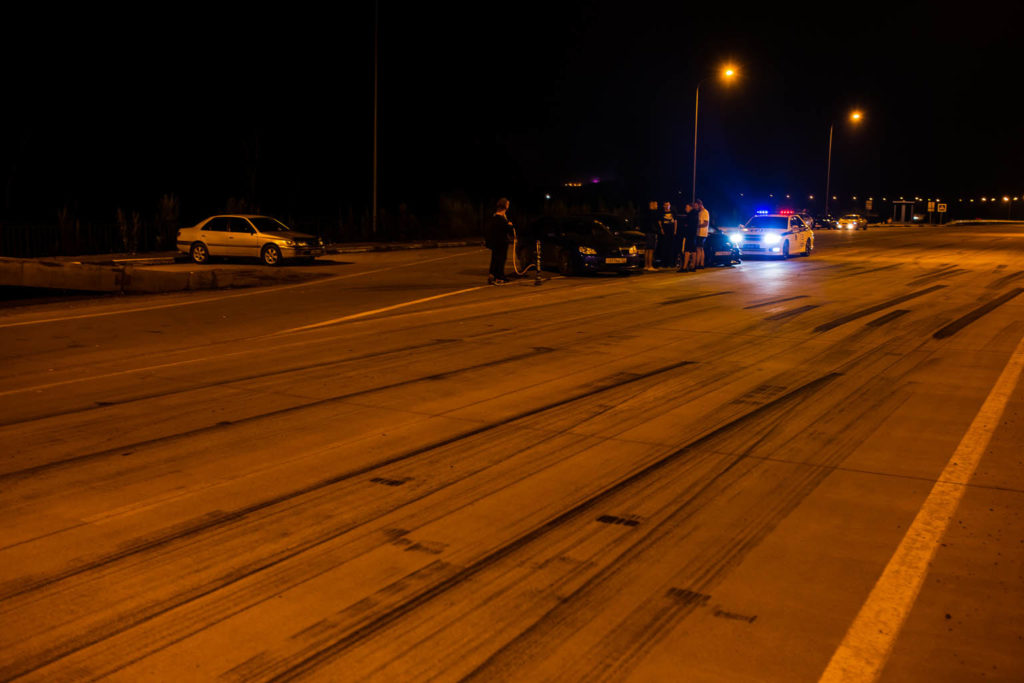- The Rapper — Oleg is only 18 and already had many jobs. Right now he's handing out flyers, but he wants to make it in music.
- The Lacemaker — Anna's profession is surprising in our present day: she's a lace-maker. But what's even more surprising is the way she choses to live her relationship.
- The Fortune Teller — If you're looking for an answer, this old lady might have one for you.
- The Impersonator — An actor of one role: how to live life, looking like President Putin.
- The Rapper — Oleg is only 18 and already had many jobs. Right now he's handing out flyers, but he wants to make it in music.
- The Lacemaker — Anna's profession is surprising in our present day: she's a lace-maker. But what's even more surprising is the way she choses to live her relationship.
- The Fortune Teller — If you're looking for an answer, this old lady might have one for you.
- The Impersonator — An actor of one role: how to live life, looking like President Putin.
- The Rapper — Oleg is only 18 and already had many jobs. Right now he's handing out flyers, but he wants to make it in music.
- The Lacemaker — Anna's profession is surprising in our present day: she's a lace-maker. But what's even more surprising is the way she choses to live her relationship.
- The Fortune Teller — If you're looking for an answer, this old lady might have one for you.
- The Impersonator — An actor of one role: how to live life, looking like President Putin.
- The Rapper — Oleg is only 18 and already had many jobs. Right now he's handing out flyers, but he wants to make it in music.
- The Lacemaker — Anna's profession is surprising in our present day: she's a lace-maker. But what's even more surprising is the way she choses to live her relationship.
- The Fortune Teller — If you're looking for an answer, this old lady might have one for you.
- The Impersonator — An actor of one role: how to live life, looking like President Putin.
The Hitchhikers
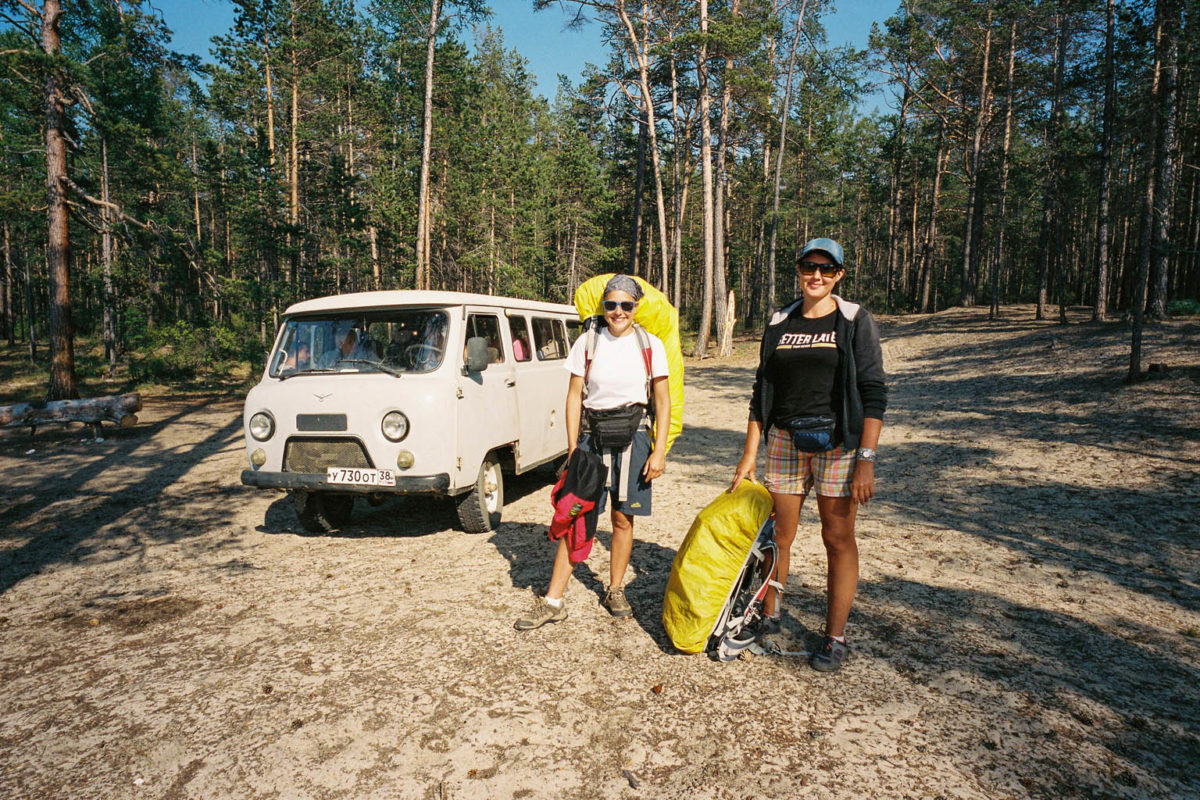
We are hitchhikers. In winter, spring and fall we have regular jobs in sales. We sell building materials and wood to save up for the upcoming travel and equipment. Then in summer we always quit our jobs and hit the road. Our employers hate this, as it is the biggest selling season. But in life you have to prioritize and for now our choice is to travel. Because it is better than sitting in an office in front of a computer screen.
It all started when our friend traveled across Russia for five years as a hitchhiker. We went for 10 days trip and after that we just couldn’t stop. First, we explored our region, Altai. And last year we hitchhiked to Crimea. We traveled 4500 kilometers from Barnaul to Novorosibirsk in six days. Then we also hitchhiked around Crimea, explored the shores of the Black and Azov seas. Now we have been traveling from Barnaul to Vladivostok for more than a month.
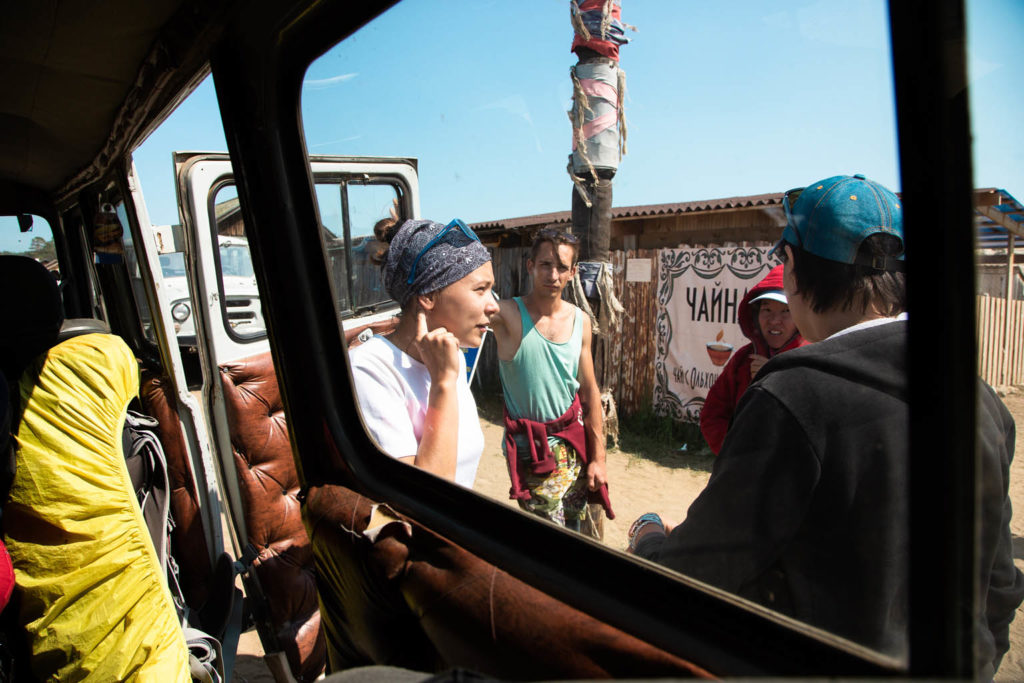
We choose routes near the federal highway so that we could come and go within three days without carrying 50 kilos of food. All the travel is planned, we initially think over the route, calculate the timing. During the trip, we ask locals where to go and we check out those places that impress us from their stories. We mostly look for beautiful nature spots, cities are less interesting to us. We sleep for free at places through couch surfing.
The drivers are well wishing people. A lot of people say “Now if I hadn’t stopped here you would have had to walk along the highway to your destination.” Everyone thinks that he alone was kind enough to stop for us and that nobody else would have otherwise picked us up. But normally as soon as we come out to the highway, we just sit in the car and leave. Sometimes drivers say that they can only take one of us, but separating is not safe.
The drivers tell us their tales. Once we were traveling through Irkutsk region. We got into the car, everything was normal. Regular introductions, “Hello, I’m Olya, I’m Zhenya, I’m Alexey”, and then we left. He started talking about people, who had sat behind bars. He said “I myself served a sentence three times”, and looked at us. He probably thought that we would get scared, jump out of the car and run away (laughs). But we are girls with humor, we began asking him questions. The whole eight hours on the road, he was telling us about life in prison: what can be made from bread, how to properly enter a prison cell and how to make chifir (editor’s note: an exceptionally strong tea, brewed in Soviet detention facilities such as gulags and prisons).
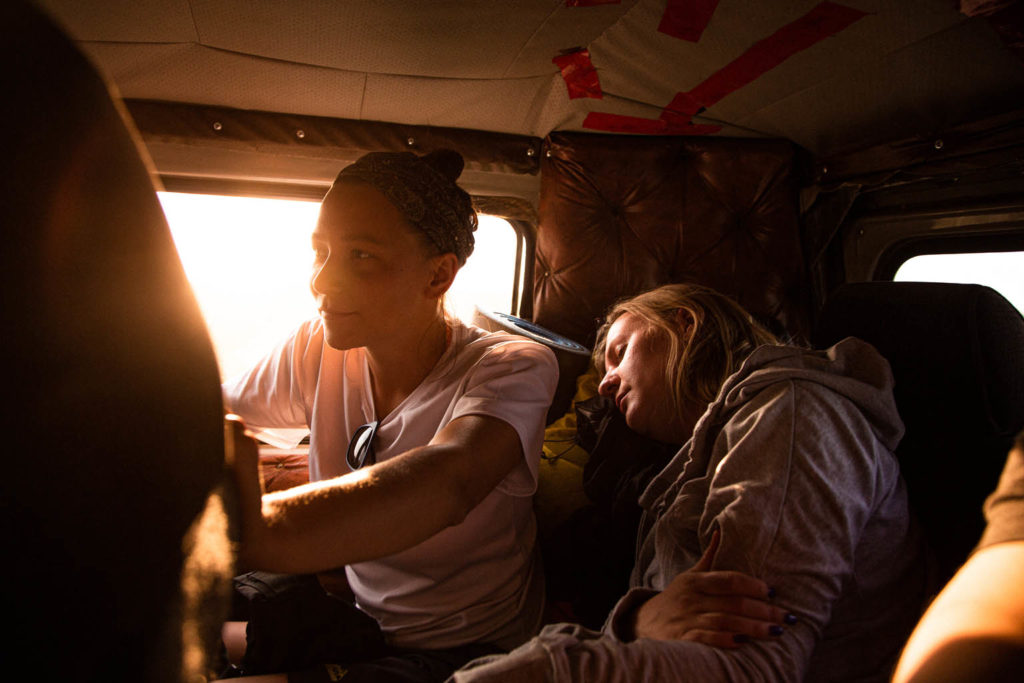
One time we spent the night at the police station. We drove to Teletskiy Lake in Altai Republic. The driver got out of the car to take our photo and didn’t put it on brake. And the car with money and documents went under the water up until the roof. We watched the car slide into the water and bubbles appear on the water surface. Like in a movie. Then until the morning: first they called a tractor, but the tractor couldn’t pull it out, he had to call a shishiga (editors note: Russian 4×4 all-road (off-road) military truck produced by GAZ) . As a result, the district police officer took pity on us and drove us to the police station. They have a resting room for staff there, they gave us a blanket, hot tea to warm us up.
Once we went with a driver on Lada, and the rain was pouring on the windshield like it was from a bucket. And the wipers didn’t work. We went more than 100 km/hr, he said “Look, girls, what I can do!” The music blasted loudly from his speakers, vibrating an entire car, and the water diverged from the windshield. He was guided only by the oncoming lights. We were very scared, it’s good that the rain in Altai is just a very quick downpour.
One time we were driven by a trucker from Pyatigorsk. He picked us up in Samara and drove us to Omsk, we drove for three days, we spent the night in the cockpit. He let us steer the wheel, and we drove a wagon that is 16 meters long, loaded with 20 tons, despite the fact we only had category B driver’s license.
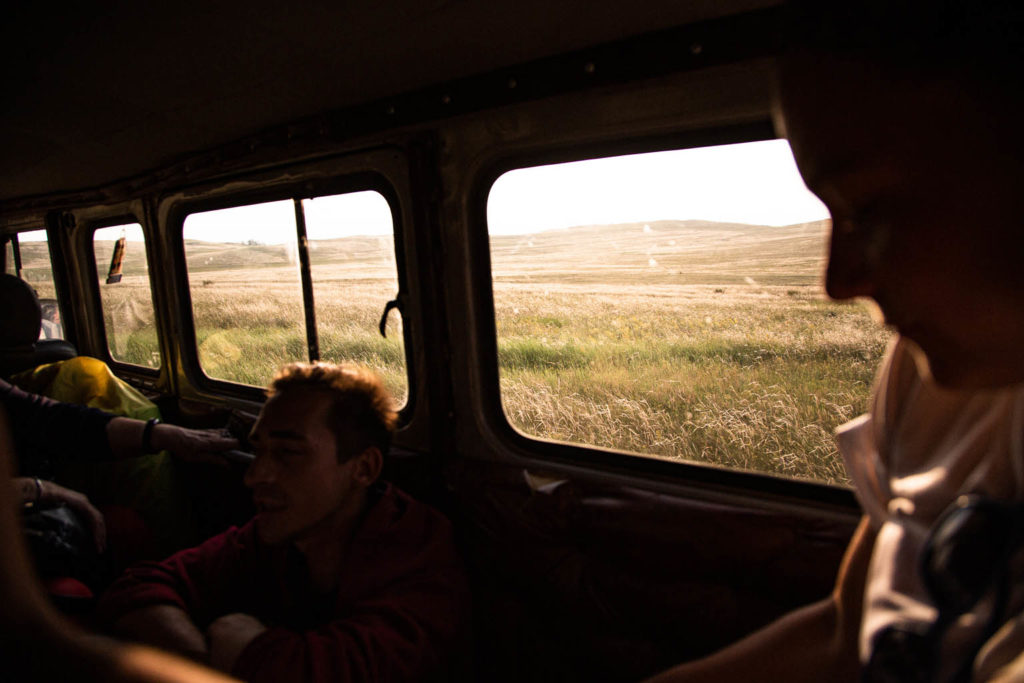
On a normal travel day we carry a sleeping bag, several pairs of socks, underwear, pants, shorts and t-shirts, hats, groceries, personal hygiene products and a first-aid kit in our backpacks.
Hitchhiking is a completely spontaneous way of traveling. You need to understand exactly what the risks are, because no one gives you a guarantee whether or not you will manage to drive a thousand kilometers today or not. On these kilometers you daily encounter many people and their stories. When you’re in your own car or a train, you can be silent. But here you are forced to communicate with people, learn a lot, leave a mark in their life, just like they do in yours. Through these encounters you learn about cool places that you can’t find even on the internet. In hitchhiking, you spend together 24/7 with your travel partner. By now se now understand each other right away, we no longer need words to communicate.
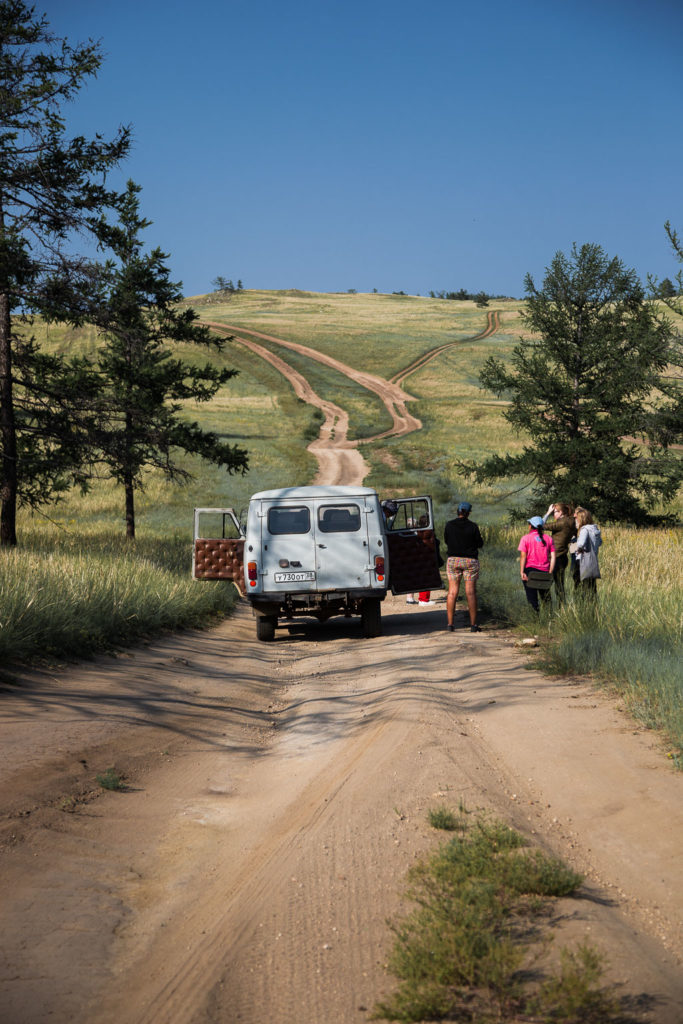
During these travels, you get acquainted with different nationalities, regions of Russia, begin to love your homeland. We don’t need to go anywhere abroad. We have such a huge country, a lot of cool places, there is no way to find it anywhere else in the world. To see them, you only need time and desire. Sometimes you see the beauty in the details. So, the heart sinks. The sunset we saw in Barguzin is nowhere to be found. Such an orange sun, cold water, cold blue. Such a warm sea, as in the Tatar bay, is not anywhere else.
Now after two months of traveling, we really want to be home. I want to come to my place, lie on my favorite sofa, hug my beloved cat. The next trip planned – in Thailand. The really popular route in South East Asia: Thailand – Cambodia – Laos.
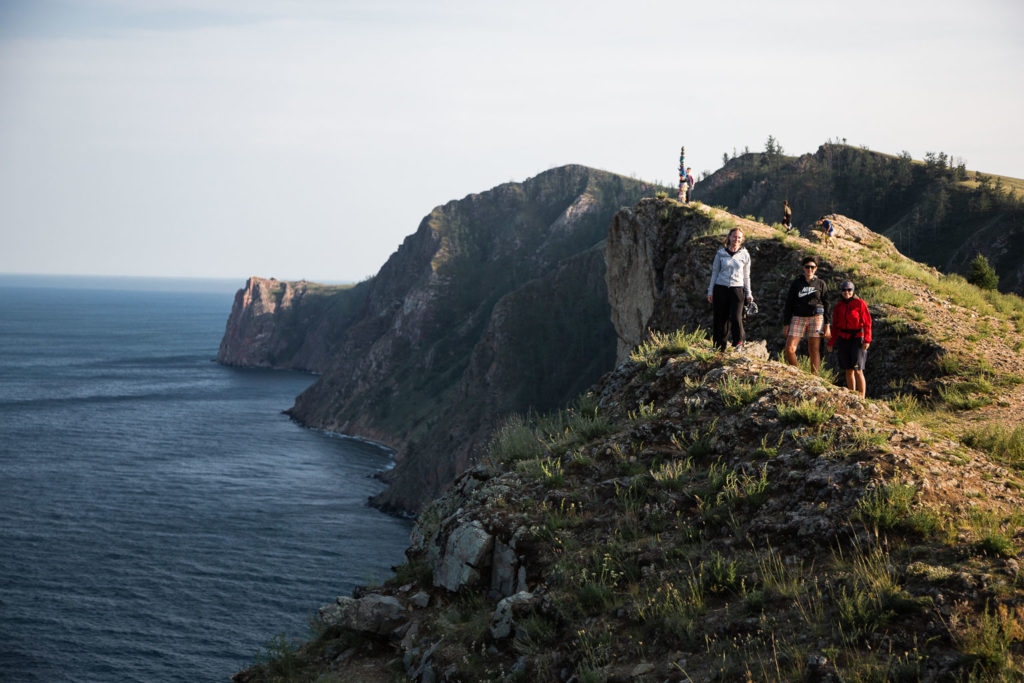
The Pregnant Lady
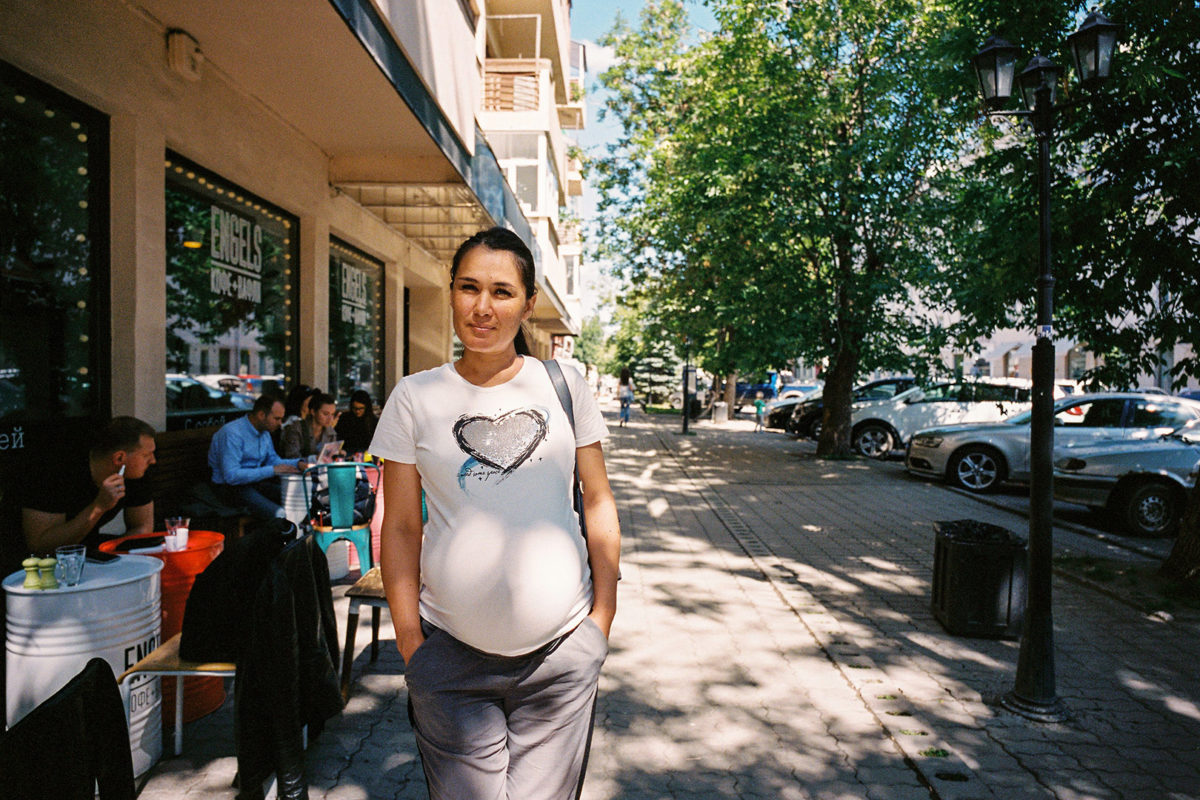
Pregnant woman, 37 years old
Today is my last day of freedom; I have C-section appointment for tomorrow. And that’s it. I will have to breastfeed a baby, no more breakfasts at a café for me (ed. note: Mesto47 team met the woman in a coffee shop). I can’t say that I dislike children, it’s just that I would have liked to live freely. But my husband insisted. I give birth to children only to satisfy my husband.
I met him on Odnoklassniki (ed. note: Russian version of Facebook.) I was working at the airport, and they gave me free internet access. Before IT guy cut off my access to social media, my husband wrote me a message.
From the very beginning I knew it was a boy. After the first baby I could not get pregnant and went to see an astrologist. Together with a colleague from the airport, we went all the way to an opposite side of Yekaterinburg to see her. Her room really impressed us; it had star alliances and horoscope signs all over it.
When she asked me, when I was born exactly, she said, “You have a close connection to your father. When you make peace with him, everything will work out. It will get stable.” She also said that she saw two boys in my house and that the place for conception would not be Yekaterinburg. It would be located at a two-day trip distance from the Ural Mountains.
At that point a relationship with my father was ugly. I had a big grudge against him. I had a little sister. When she was twenty, on the second year of college, they found a tumor in her head. Exactly the same diagnosis as Janna Friske (ed. note, Janna Friske was a famous Russian pop singer, who died after brain tumor diagnosis). During the three years of my little sister’s cancer treatment my father did not support my mother morally, needless to say, financially.
We fought endlessly. I would kick him out of the house, insisted that he and my mom would get a divorce. He was drinking. But my parents are affected by this mentality of being raised in a village. If you get married, it is only one time for your whole life. A divorce just because your husband is drinking and he is not helping? Unspeakable! What can one do, he is a husband, a father. The master of the house. Our men are weak, and I had to take the responsibility for my sister’s upbringing upon my shoulders. She fought for three years and died.
Anger against my father was accumulating, but after astrologist advice I started saying hi to him, when I came to visit my mom. I might not have forgiven fully, but I just forgot about it, tried to ignore it, because my husband wanted children and family. And it worked. After this incident my husband went on a business trip to Astana, two days by train from Yekaterinburg, and I got pregnant.
I do believe that fortune telling is nonsense. But following some kind of advice is different. For example, you have to make peace with your father for something to happen. Fortune telling and energy are two different things.
At the moment it’s hard for me physically. I can barely get up, sit down or lay down. Women should give birth before they are 35, it is probably inborn in their nature. Now, when an app on my phone tells me that walking somewhere will take 30 minutes, I calculate an hour.
After giving birth I will miss travelling. When you fly to Asia, everything is spicy, a lot of seafood, sometimes even an adult would be scared to try some food. You have to always think about the child. When the child is born, we will move to Sochi. Ural has a bad climate: a long winter and spring, and my husband and I like it when it is warm and green.
I will call him Jan. It’s an ancient Jewish name. His father is Ruslan. So his middle name would be difficult, that’s why I went for a short name. (ed. note: in Russia, a person’s middle name is derived from your father’s name).
The Communist
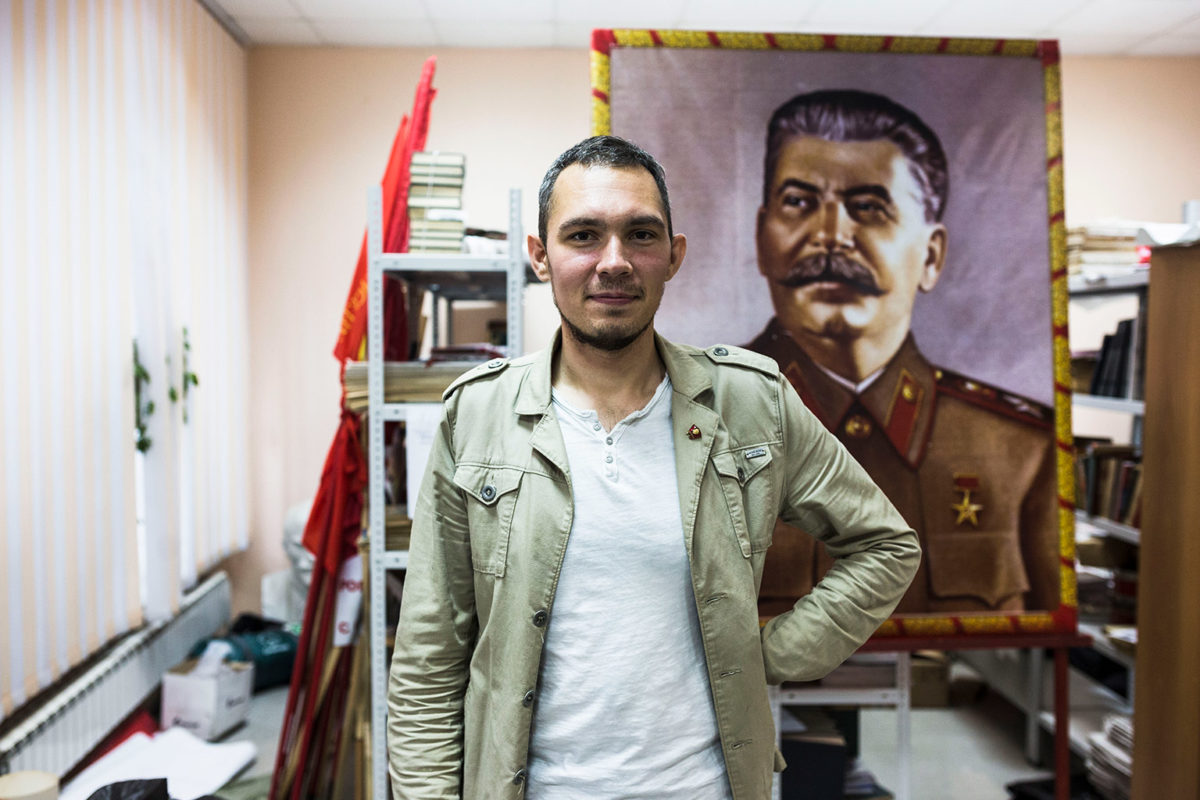
Ivan, Secretary of Agitation and Ideology
Khabarovsk Bureau of CPRF, the Communist Party
of the Russian Federation
As we, меsто47 team (photographer Georg and writer Marina) stroll around Khabarovsk, an enormous red Soviet flag draws our attention. “Khabarovsk bureau of the Communist Party of the Russian Federation” reads a sign on the door. We try to catch a glimpse through the window, and the interior looks like museum of Soviet history: there is a huge Lenin poster on the wall, calling for hard labor as a direct highway to socialism and a shiny, almost brand new bust of Stalin . After some debating, doubting and hesitation, we decide to walk in.
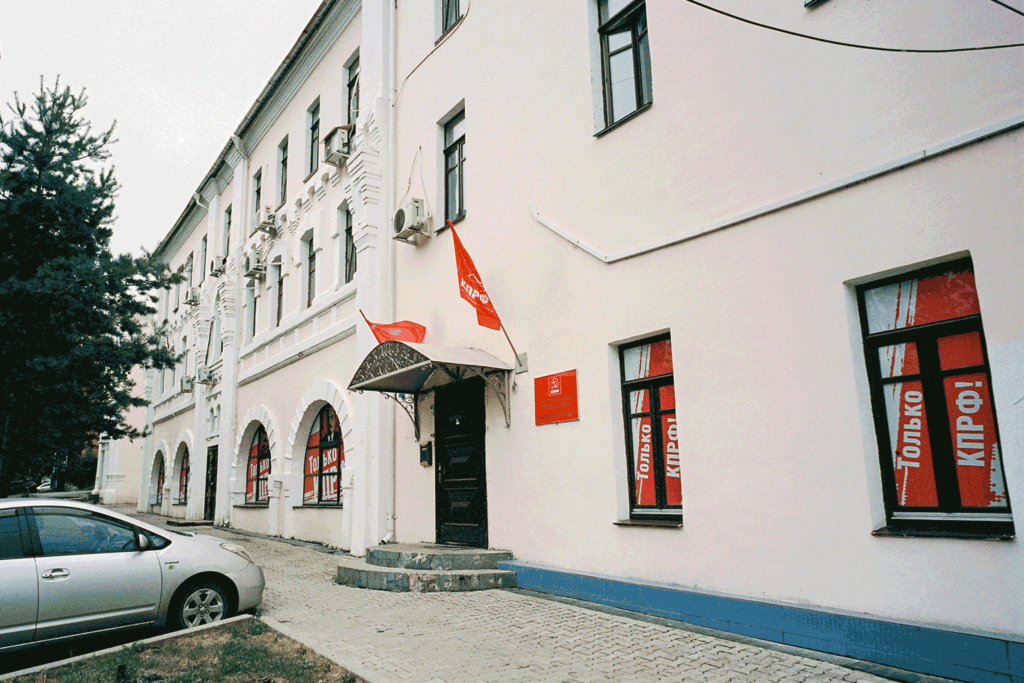
The first thing we see is a portrait of Stalin, a huge stack of freshly printed newspapers and a bunch of flags, rolled up and put in the corner. The man at the reception desk asks us what we want. We ask for a brochure, but he instead he suggests to talk to Ivan, who welcomes us with a smile and an introduction of himself and his long title,
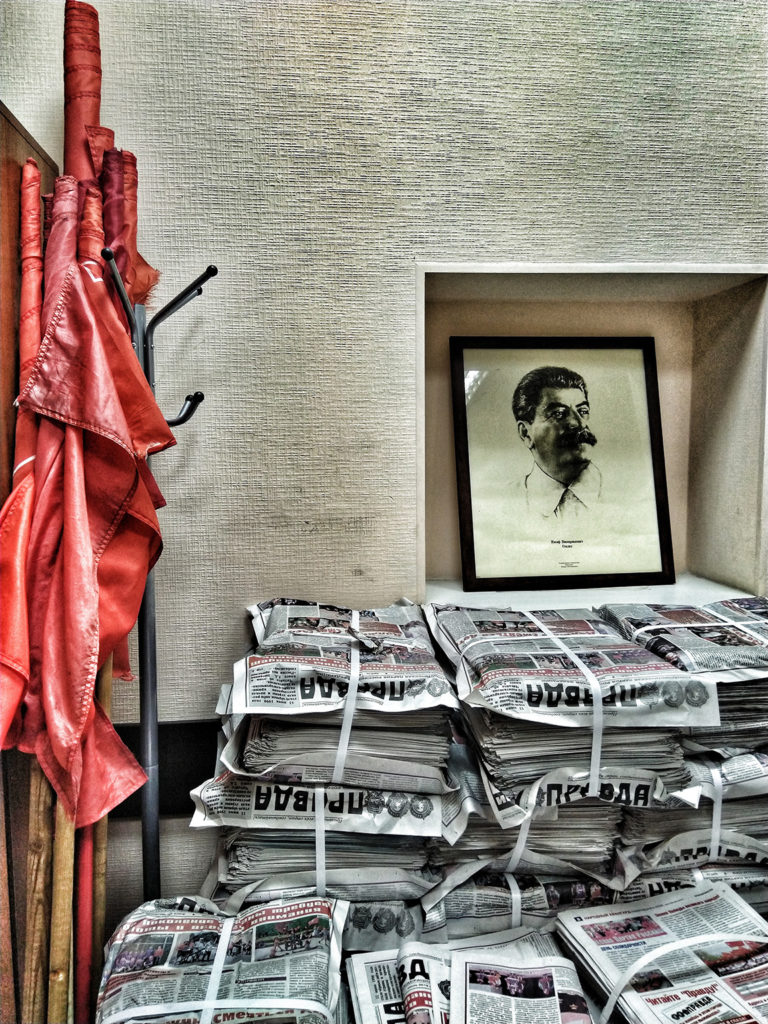
“Nice to meet you, I am Ivan, Secretary of Agitation and Ideology, for Communist Party, Khabarovsk Bureau”.
We are surprised by how young he is, he should be under 30. We explain the concept of Mesto47 project as a collection of human stories, and he agrees to an interview.
“Just wait here for a bit. I need to finish writing couple campaign slogans and will be right back with you.”
While we are waiting, a man in a suit, on his way out of the office asks us who we are and what we want. After a quick explanation, he turns to Georg and – in perfect German and very direct – tells him that he hopes that Georg knows that Austria is only what it is now, because of the Soviet Union, as the other allies in WWII wanted to split it, like Germany. We later find out that he was a diplomat in the soviet embassy in Germany.
The wait gives us freedom to look around the room and study all objects. Communist brochures. Endless photos of Lenin. Printed slogans. Schedule of party regional and national meetings. Party newspaper and rulebook. Like we rode a time machine back to the USSR.
After twenty minutes, Ivan calls us in, lets us turn on the recorder and starts telling his story.
Ivan: I was born in Khabarovsk, I have lived here all my life. In Russia, family history is important.
I am very proud of my grandparents and great grandparents from mother’s side. During Tsarist times, my great grandfather killed a manager of his landlord, because the manager wanted to take everything from his family and starve it to death. He was sent to Kursk by force. My grandfather fought in the Second World war, he was a partisan during occupation. After the war he was a director of production on a big factory in Khabarovsk which exported its products to Japan, Saudi Arabia and eastern Europe. He was awarded the Order of Friendship of Peoples (ed. note: a Soviet order, awarded to people for strengthening international friendship and cooperation). My other great grandfather was a sovkhoz chairman.
Ivan looks at Marina, trying to find an english equivalent of the word “sovkhoz”. They both laugh, trying to come up with a suitable term. It is one of those words that sounds so natural for a Russian who was born in the USSR (even in the last months or days of its existence), but it would take a while to explain to a foreigner who is not familiar with daily lives and bureaucratic acronyms for things in post-Soviet Russia. These terms come up all throughout our conversation. Sovkhoz, a state-owned farm. Komsomol, the All-Union Leninist Young Communist Leage, a political youth organization in the Soviet Union. And many, many others.
Ivan continues,
My parents were also born into a working class family. My father was a firefighter. My mother studied engineering, but during the 90’s, because of the USSR’s collapse and difficult economic times, she worked almost everywhere she could find work: selling goods at the market, in the fire brigade on a call line.
Of course, everyone had a different childhood, but childhood in 90’s Russia was very different from the one children are having today. It’s this feeling when you don’t know whether you will have something to eat tomorrow.
There were many gopniks (ed. note: young men of lower class suburban areas). Every day, when I was walking to school, the gopniks were picking on me, whistling and telling me to approach them. They were sitting in garages in their Puna and Abibas (ed. note: chinese knock-offs of big brands) suits, teen gangs trying to get money.
I had a Dendy (ed. note: Nintendo clone, produced exclusively for the Soviet and later Russian market). Happy childhood (smiles). And a lot of books. And books made me a communitst. I read a lot. There was a cult of knowledge in my family. When I was a boy, my mother taught me about art, she showed me works by Vereshchyagin, the famous Russian war artist, and the Renaissance period. She read Russian poetry and Russian classics to me. But most books of my childhood were encyclopedias. When you read a lot, you shape your view of world economy and society. The leftier the book I was reading, the more coherent it seemed to the reality I saw around me. And I read, read, read. In high school I was a liberal, but slowly and steadily I was becoming left.
I became a communist after my 10-days trip to North Korea in 2015. I visited both Pyongyang and the north of the country. The capital is a magic destination. The countryside is poor, but clean. It’s in order. It’s a simple life. They are not rich, but they are not dying or starving to death. The korean countryside looks better than in Russia. Russian villages have run down houses, many ruins reminiscent of the Soviet era.
They do say that in North Korea they only take you to Potemkin villages, but it is hard to do that, when you take alternative routes from one city to another for thousands of kilometers. As you ride, you see painted clean houses and many fields. And it makes you think that socialism is not so bad. When I returned, I applied for Khabarovsk Komsomol, and a year later I became a member of Russia’s Communist Party.
Marina: So they brainwashed you very well in North Korea?
Ivan: The beer was excellent, yes (laughs).
Georg: Did ever you visit a western country?
Ivan: When I was in school, I was in Finland and one day in Stockholm. Of course I admire the economic standard of western countries, like USA and Japan, or South Korea. But I think that a lot of those standards are paid for by unfair trade and workers from other countries. There is an inequality in international trade and exchange of goods, that’s why some countries gain more and some countries get less.
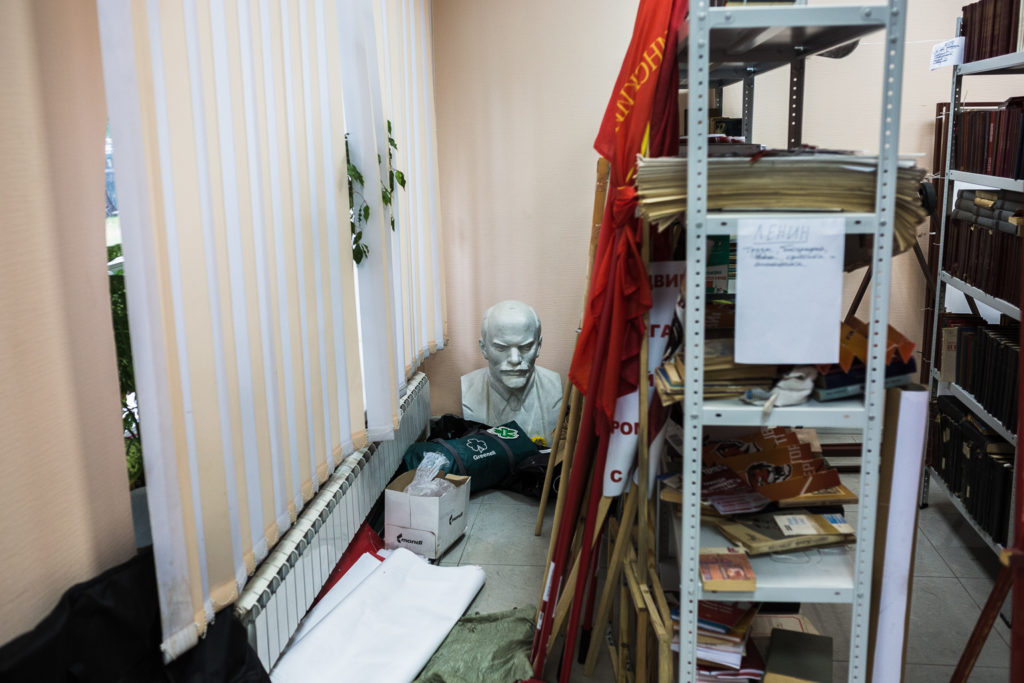
Even liberal people who study Korea, say that if the two Koreas will end up together as a market economy, it will be a catastrophe for North Korea, due to the lack of employment opportunities for North Koreans. It’s a hierarchical society, and North Korean people will end up at the bottom.
Georg: So what exactly are your responsibilities?
Ivan: In Soviet times the word “propaganda” in my title stood for “education” or “enlightment”. I define the direction of election campaigns. Should we be more like “old CPSU (ed. note: Communist Party of the Soviet Union) is back” or ”We are simple people like you” to win the election.
Georg: Isn’t it all a bit outdated, the image and style? Are you not planning to modernize it? To get the ideas better into the 21st century. If you propose a new, technologically developed communism, why are we greeted here by Stalin and Lenin?
French people still sing La Marseillaise and they still relate to Robespierre as a great revolutionary even though he is considered an incarnation of Revolution’s Reign of Terror. Two centuries later, the French Republic is a normal western country. It has implemented a lot of his original ideas, maybe in a different form with different content.
Already in the 90’s, communism has brought in computer science for better planning. In the late USSR times, there was a lot of work on combined math and socialism. The future was seen as computer planning, with no government or bureaucrats making decisions. Glushkov from the Academy of Sciences developed these theories. To put it simple, let’s say you want to open a café. You load your idea into the computer, and it calculates how it will suit the overall plan of the country. If this initiative is timely, if there is enough building material for you to proceed.
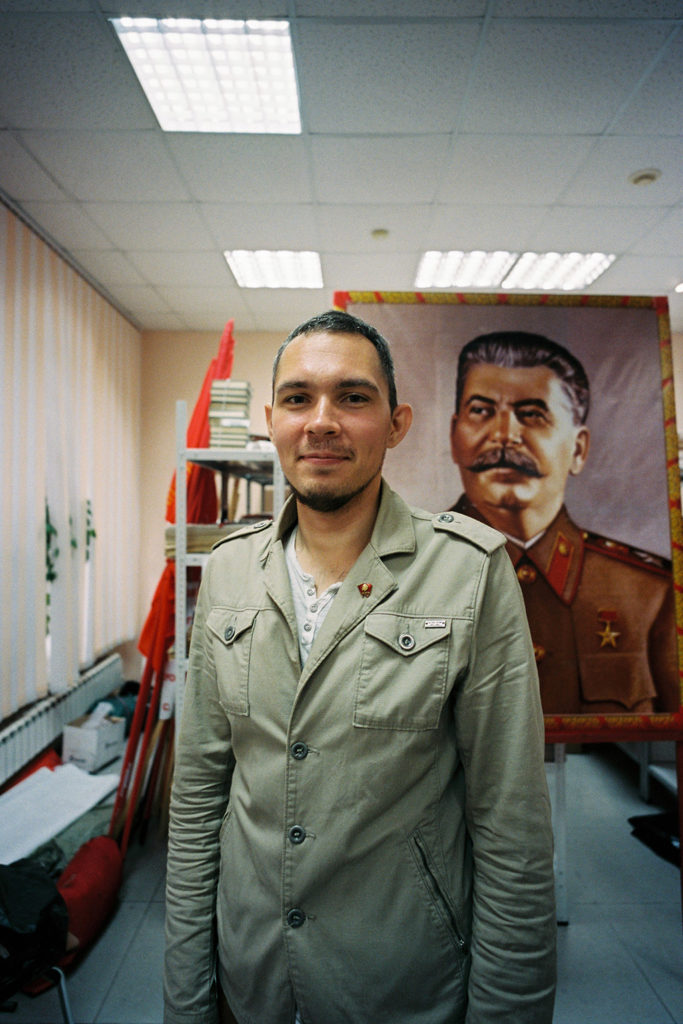
Marina: Is communist a 24/7 ideology? Do you have a portrait of Lenin at home?
Ivan: In my house I have a small Lenin portrait, in my bedroom. I have a hand-painted portrait of Mao Zedong. I personally love him a lot, not only because he was a great visionary and had great success in factory building, but I respect him as a politician and master of intrigue. And a lot of things I was reading about him in his biography were close to me. I respect him, because he achieved an industrial revolution in a country without an industrial proletariat and it’s a great breakthrough in communist theory and practice. He succeeded in leading a mostly peasant (which is a small kind of bourgeoisie) country into socialism.
My girlfriend is a communist too. It was not a must criteria for me, but it is still pleasant she shares ones political views. I met her at a Komsomol party meeting in Moscow.
As the interview is coming to an end, we stick around and chat about our trip. We show Ivan a kiss selfie we made in Ulan-Ude with an enormous statue of Lenin’s head. He approves, jokingly saying that communists embraced kissing culture since Brezhnev times. “An intimate kiss that goes into the dents”, that’s how our leader put it.
As Georg searches for a photo spot, Ivan goes to a large Stalin portrait without any hesitation and poses for a photo. We say good-bye and leave the bureau. But before we go, Ivan gives us a present: beautiful shiny Communist party pins. We thank him and put them on our jackets before we leave. Just to take them off again as soon as we turn to another street.
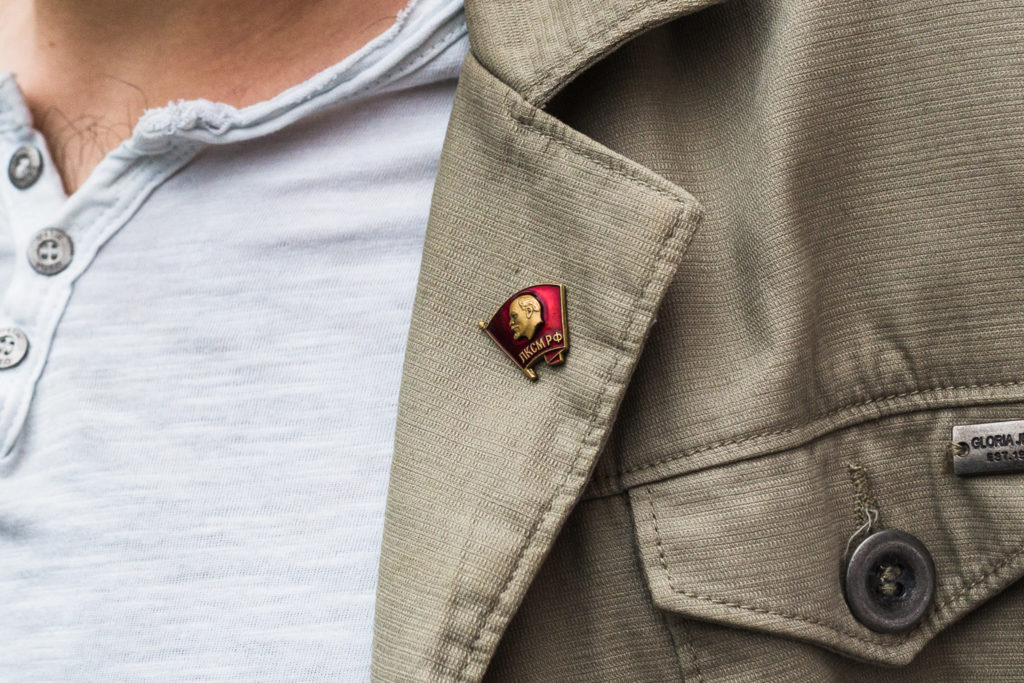
The Sailor
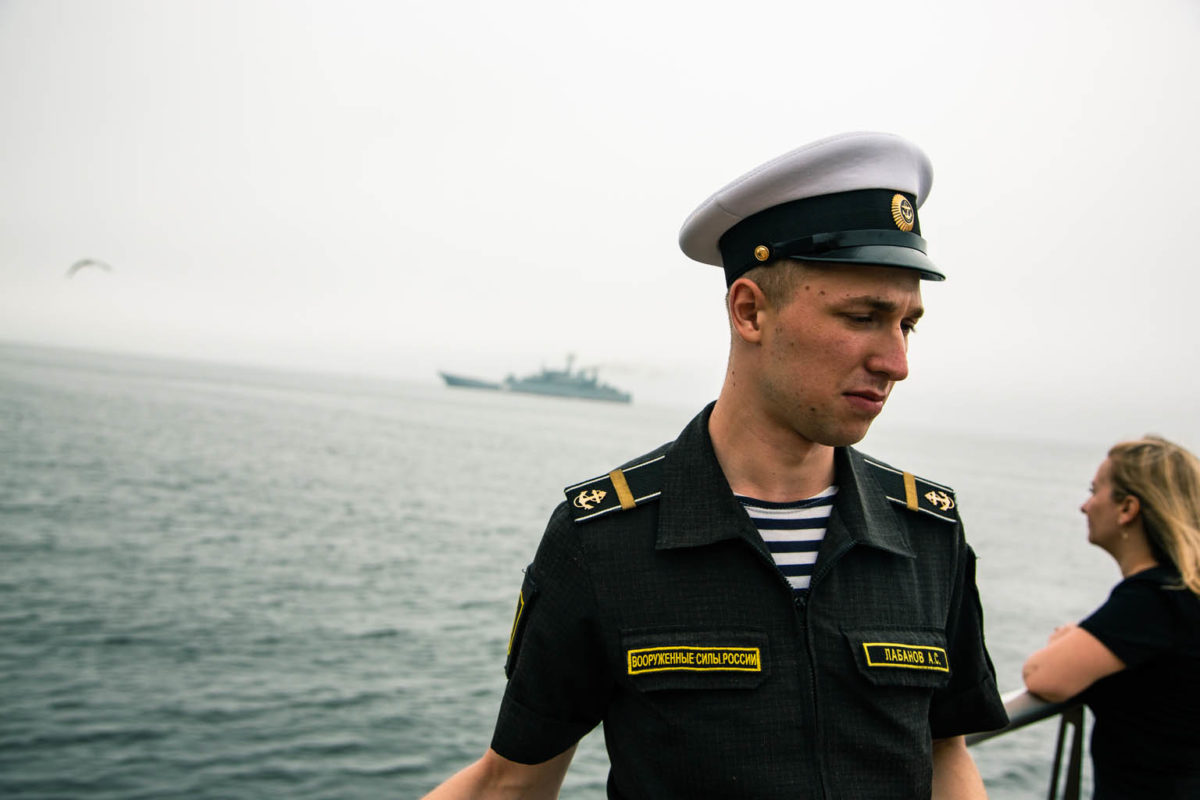
From childhood on it’s just been me and my mom: my dad died in a motorcycle crash before I was even born. When I was in school, my mother was getting her education, and from the fifth grade on I was already completely independent.
In my upbringing my grandpa played the biggest role. From the beginning he showed me his cap and dagger, he brought me up as a military man. He fought in Chechnya and told me about how terrible everything was there. How his friends were killed, how the fight for their bodies began, because the enemies often took the dead and made videos mocking the bodies. For 24 hours they would fight back just to return the bodies of the fallen to their families. My great grandma also fought from 1941, she even went to Berlin. She was injured by shrapnel in her leg and could not walk. She told me it was possible to tell children about the war and showed me her awards: three Orders of the Red Star. I am very proud of her.
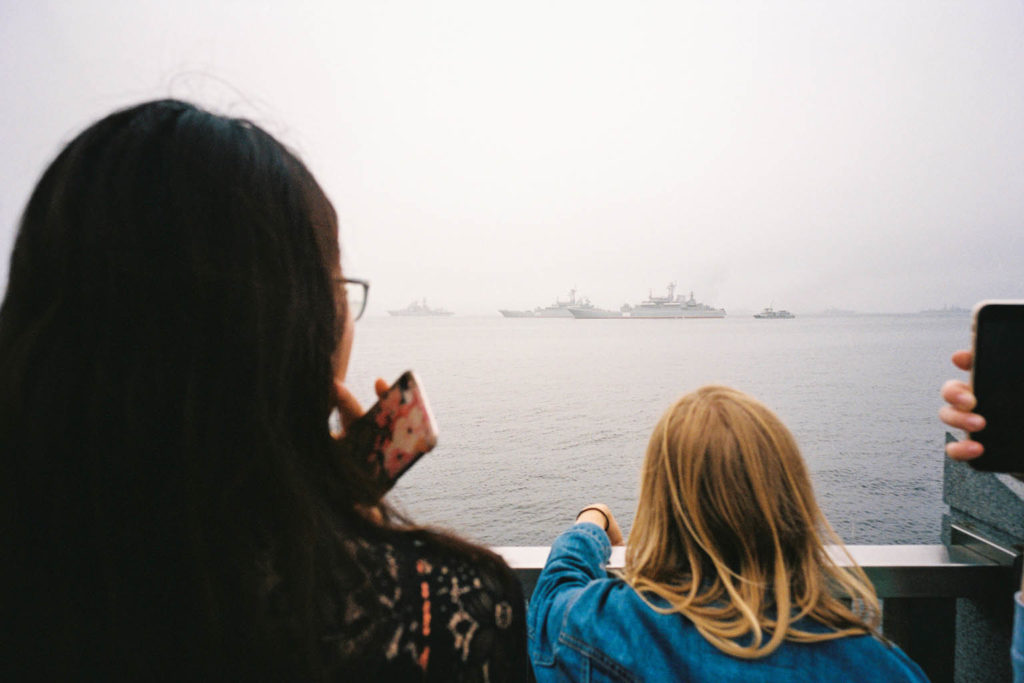
Grandpa always told me that I need to serve my country and from 6th grade I dreamed about joining the navy. I’ve always loved the elements of the sea. In my room, I have sailboats and compasses painted on the wallpaper, and the clock is made in the form of a helm. After 9th grade I enrolled in the Higher Naval School. Right now I’m studying in the final course. At first it was difficult to adjust to the Navy discipline. At home I’m free but there, everything is strict: drills, training, uniform… When they give you an order, you can not argue, you just say, “Yes, sir” and do it.
One time, when as I was on guard duty, I saluted my sergeant, but it seemed to him that I had done it too quietly. He decided to teach me a lesson, and made me do guard duty one after another three times. It meant four days of standing with only four hours of sleep. I came home and fell into bed, just like that, weak and still in my clothes. Many can’t stand it, but I told myself “Bullshit, I will break through it, everything is fine!”
My first time at sea the, sensations were unusual. A complete delight. Sailors have this tradition: when it’s your first time going to sea, they pour you a glass of seawater and you drink it. That means you’re a true sailor – I tried seawater, let it flow through me. I drank the whole glass in one gulp. During my first time in a small storm, I was afraid. The boat rocked hard. It was an average storm, but the ship was small and it was enough for me as a beginner. I laid down and rolled around, I was tossed from side to side.
When I first got on a submarine, we were told, “Forget what you were taught in school”. I went over to it and thought “Wow, this is ginormous!” Nearby, it turned out to be even larger than from afar. Below the surface it goes another six meters. With my height 1, 83 cm (ed. Note, 6ft) it’s difficult. There is very very little space. You bend over all the time, people are walking around like ninja turtles. The boat may be at the bottom of the ocean for a month, during which time you won’t see the light of day. To understand if it’s day or night on the boat they regulate the lighting depending on the time of day: in the morning they turn on the light, and by the evening they turn it down.
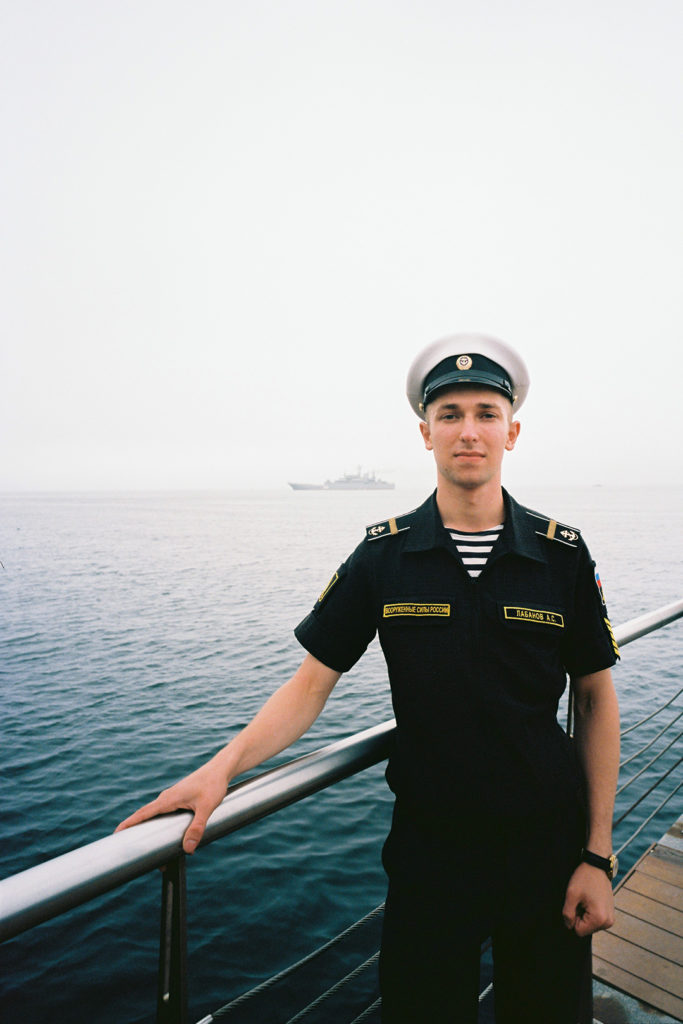
It’s psychologically difficult. You’re packed like sardines in a can. No portholes. You see nothing around you. My sailor friend says “Spin the globe and touch any part of the ocean – I’ve been there. I didn’t see anything”. Then you go out and see the light of god and rejoice, thinking “God, it’s so good”. Friendships made during service – they will last for your whole life It plays a big role in the collective work. Everyone interacts with each other. Nobody is alone. Therefore, we have such a trait – even if you are in conflict with someone over the little things but that person needs your help, you help immediately.
Being in the military it’s difficult to find a life partner. In 9th grade I started dating a girl. I thought that she was the love of my life. At the end of the year I proposed to her. I liked our little family: me and her. Then I had to leave for a month of training at sea. When I returned I accidentally saw a message from another man on the screen of her phone. While I was away, she met a civilian. She tried to talk to me, asked me for forgiveness, but can betrayal be forgiven? From the person you have to trust. How can I go back to sea, thinking that she will be with someone else again? I myself am a faithful person, if I say that I am with you, it will be so. I can’t build relationships without trust. You can not do it this way.
It was very painful. But I compensated by working hard in my service and doing sports. And I survived. I don’t regret anything. It was an experience of family life. When you were making the choice, you were feeling good about it back then. The last time I saw her was at the civil registration office when we were filing for divorce. I can’t believe that I’m 21 and I’ve already been married and divorced. Hell, I’m scared to look at my passport. It feels like I’m 30 already.
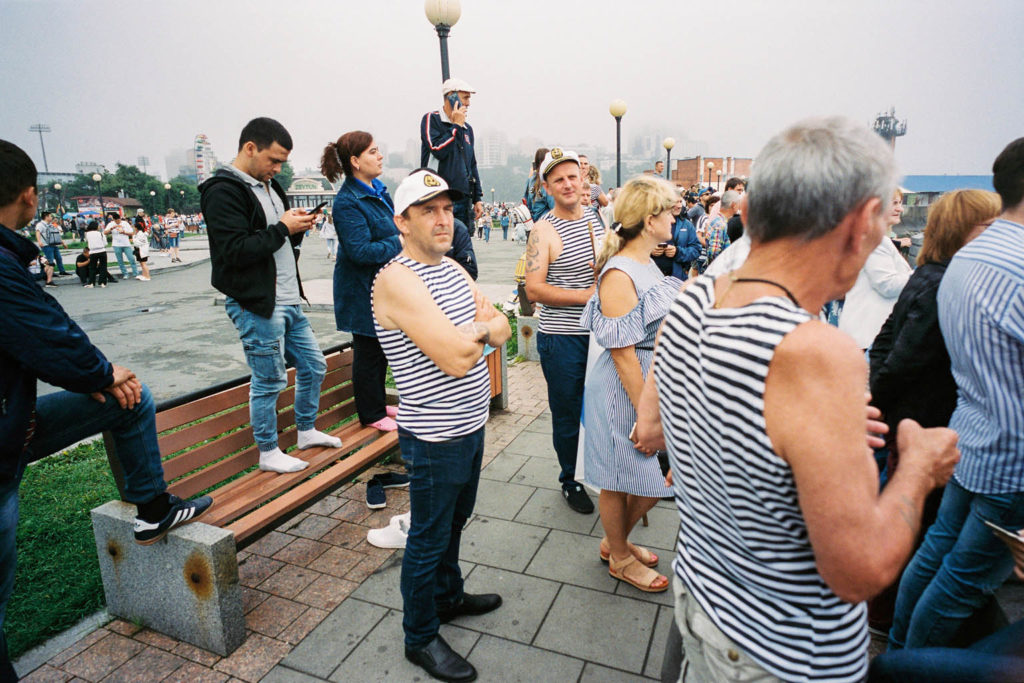
I still can not find the girl of my dreams. She doesn’t necessarily need to be smart, but even just savvy. I can’t say I am well-read myself, but I’ve got common sense. The wife of an army man needs to be supportive. Her attitude should be like, “Here are the bullets, who are we shooting?” Many girls try to hit on me, military uniforms work (ed. Laughs), but in their head many girls just think about shopping and hair style products. Once I could not stand it and said to one girl, “It’s easier for me to hug a birch tree. It will be more interesting to talk with that than with you.”
I don’t get hung up on this, for me now the main thing is the service. My goal is to become a first rank captain. Most likely, they will send me to the north of the country. In the ranking system, one year of service there counts for two, which is very good. Sure, the climate there is awful and in summer, the sun never sets. The time of day there is defined as follows: if there are a lot of mosquitoes, then it’s daytime. If there are even more of them, then it’s dusk. And if they are gone – night has come.
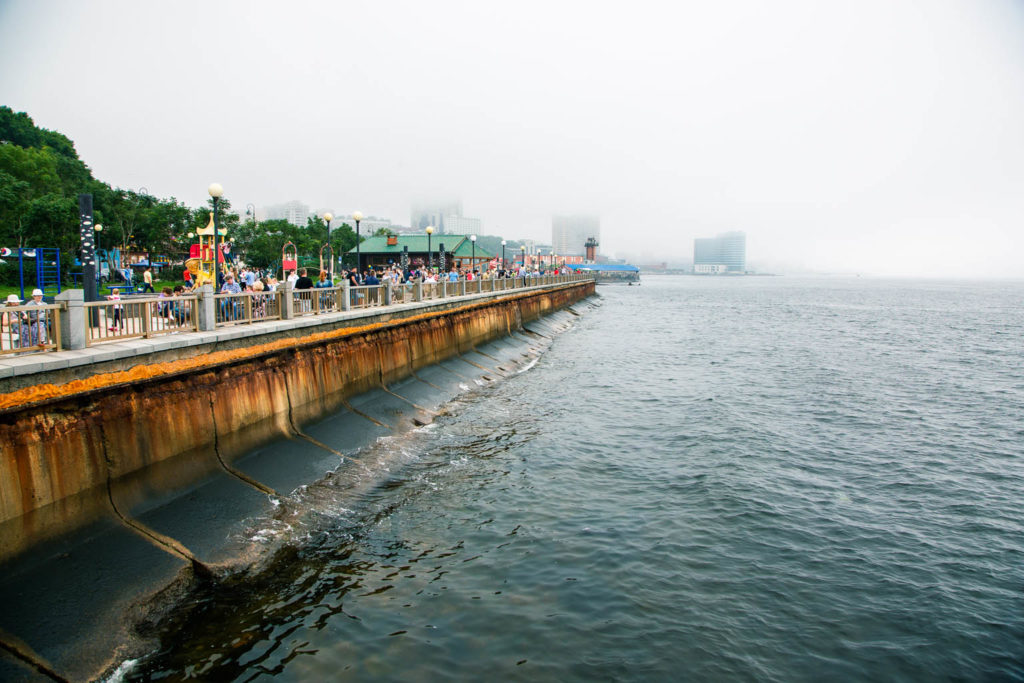
My grandpa is very proud of me. His eyes are shining, he is glad that I am studying to become a naval officer and that I have chosen the profession of a military man. He always says “This is my grandson – a real sailor!” At his house he has a framed photograph of me, taking the oath.
There is an old saying “If you pick up a sword, you can be sure that sooner or later you will die from it.” If you choose the military profession, you must be prepared for the fact that sooner or later you will need to fight and give your life. If you are not ready for this, then you should not even go. I hope that I will be a worthy officer, I can teach and educate my subordinates the way that my grandfather raised me.
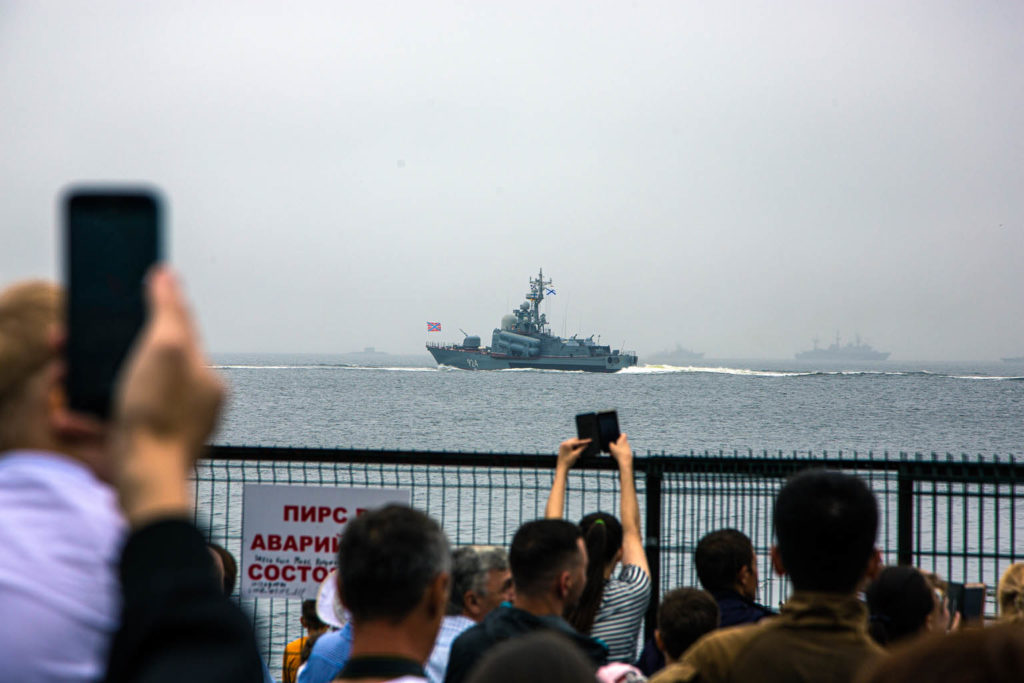
A soldier must know what he is fighting for. I know my country is dear to me. I am a patriot of my country. This is my country, I love its territory, nature, its inhabitants, people – literally everything. I grew up here. My grandfather fought, my great-grandmother gave her life for this country. I have something to lose.
How do you approach a stranger on the streets? How do you ask to take a photograph without speaking the language? What seem to be barriers at first make it easier in the end. You just ask. Its easier to speak a few words, but it works just as well without. You show the camera. They gesture to go ahead. There’s only a single exposure. Nobody can see it, because its an analog camera and there’s nothing to talk about, since we don’t share a common language. A handshake. No words needed.
Можно (мozhno) is russian for “may I?”
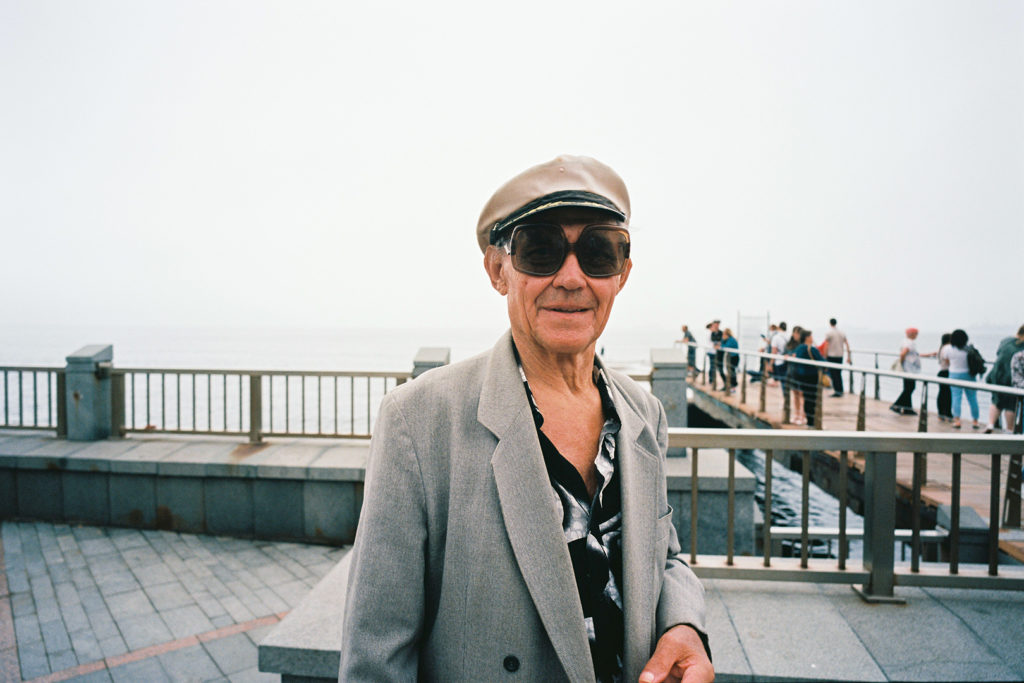

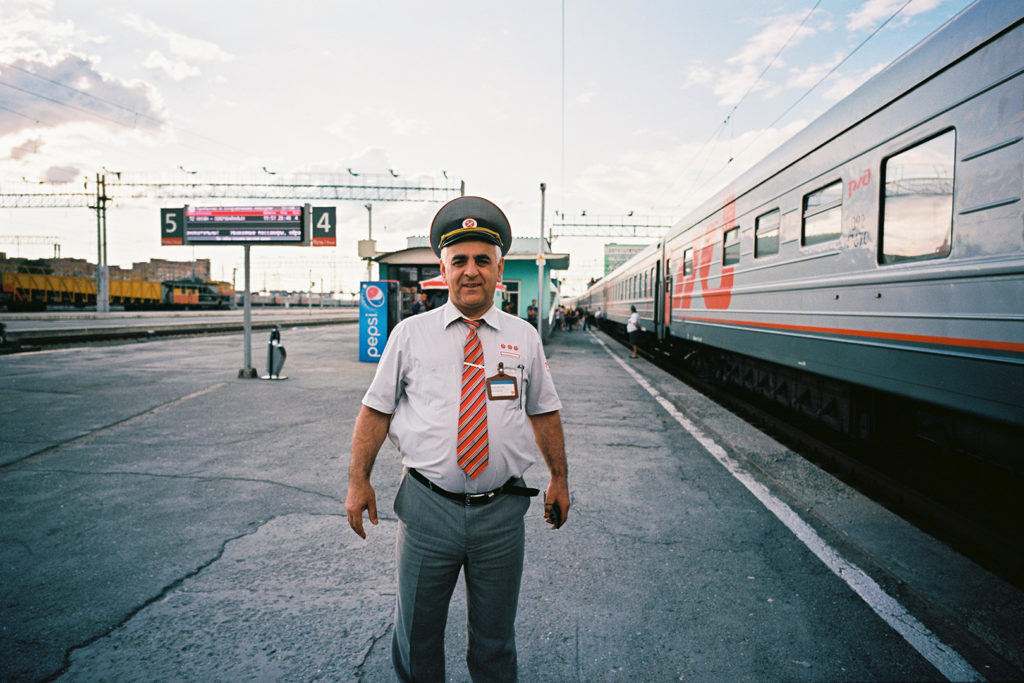
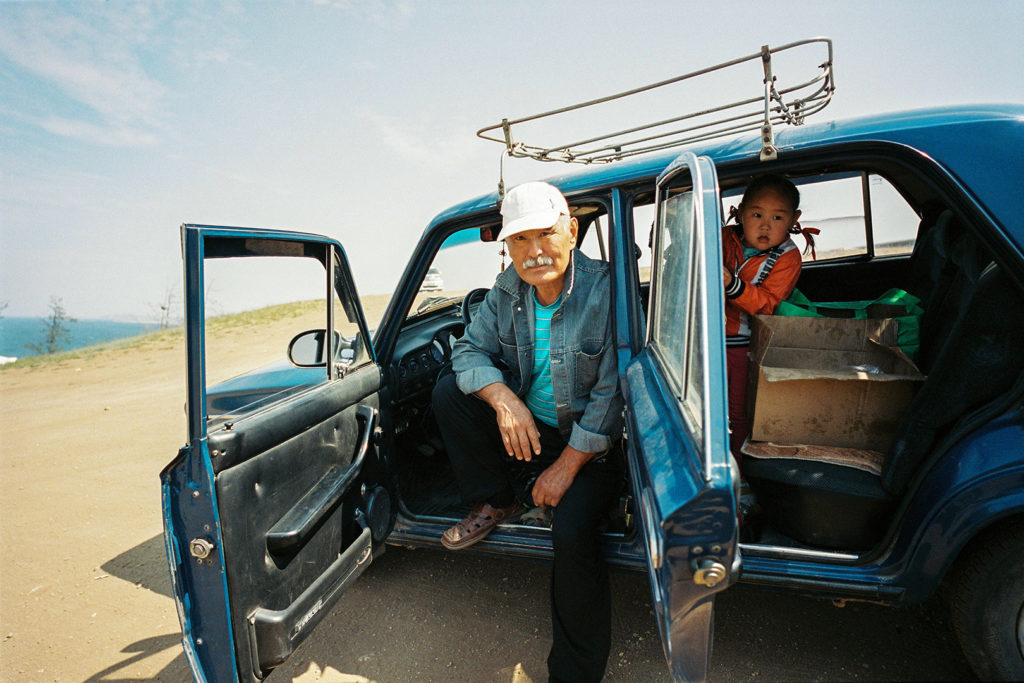
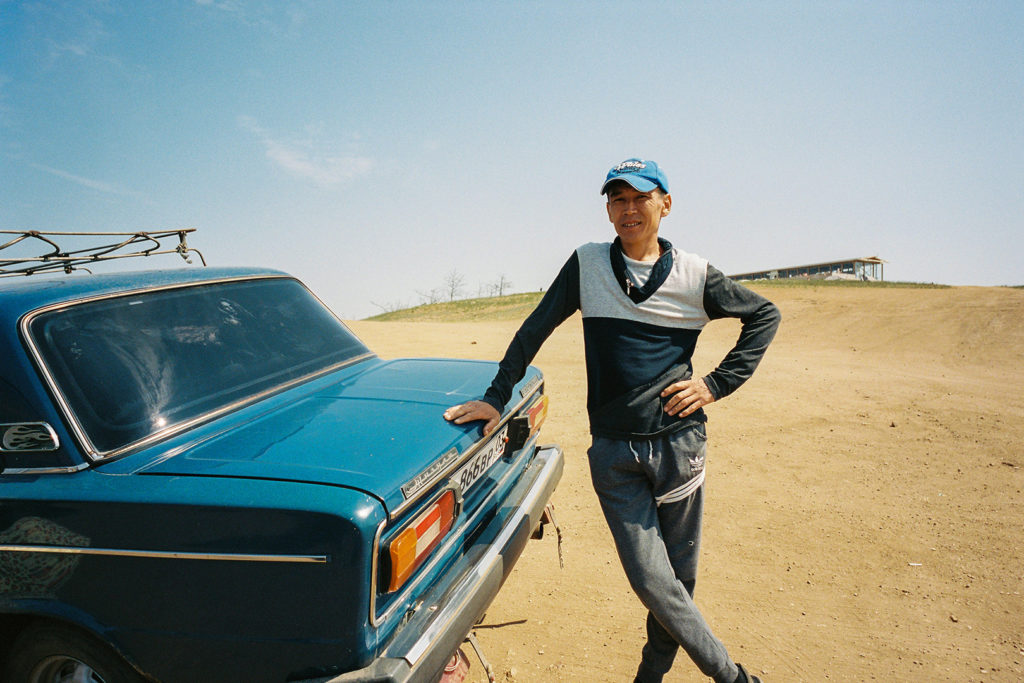
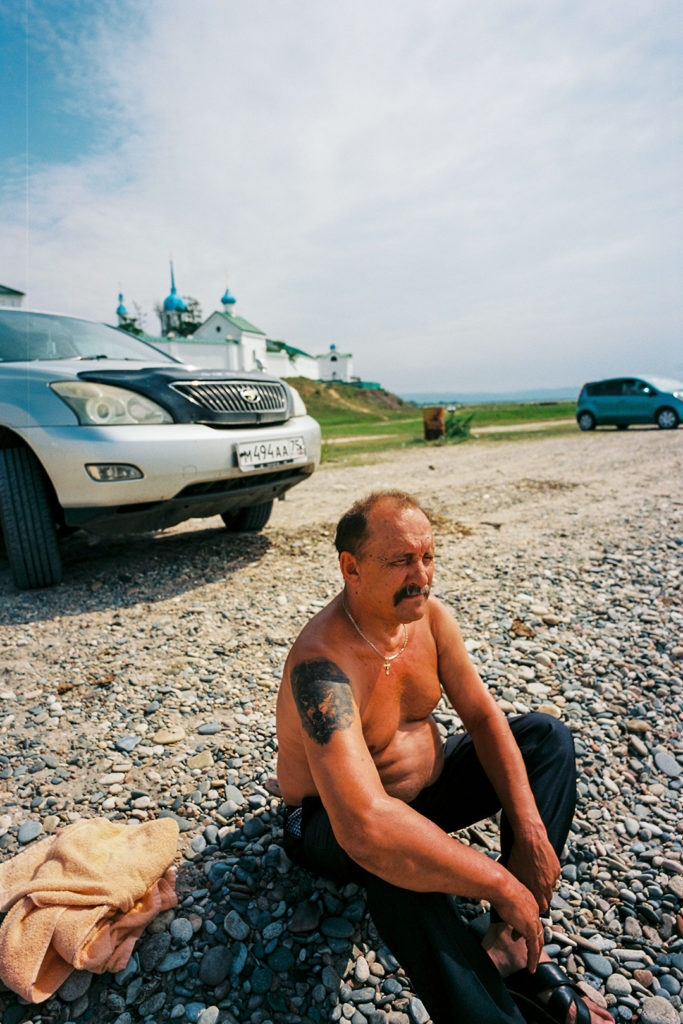
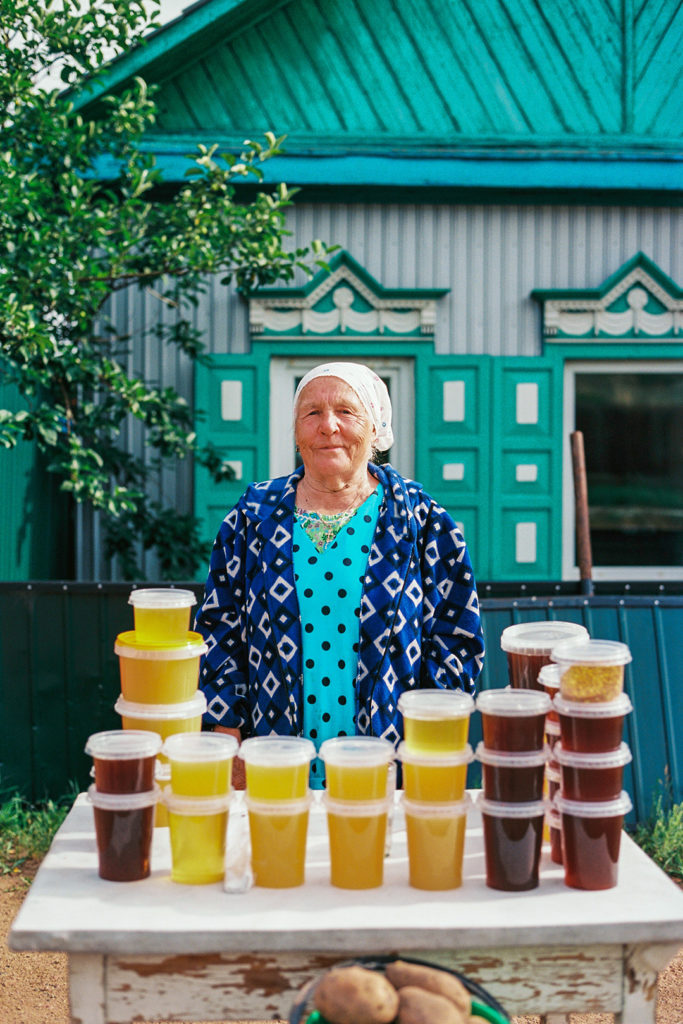
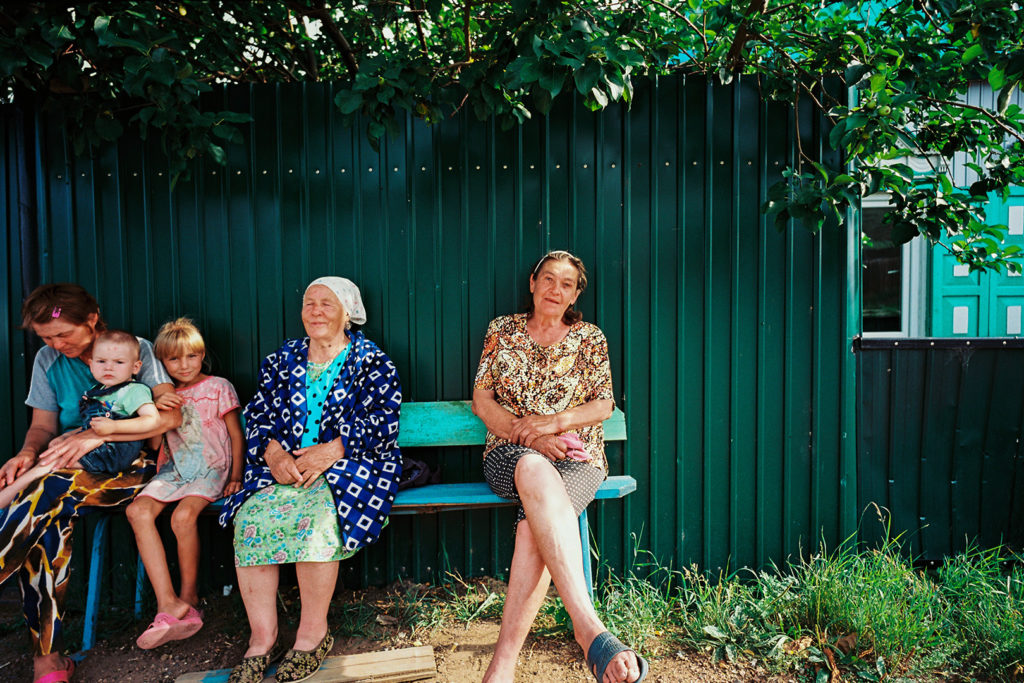
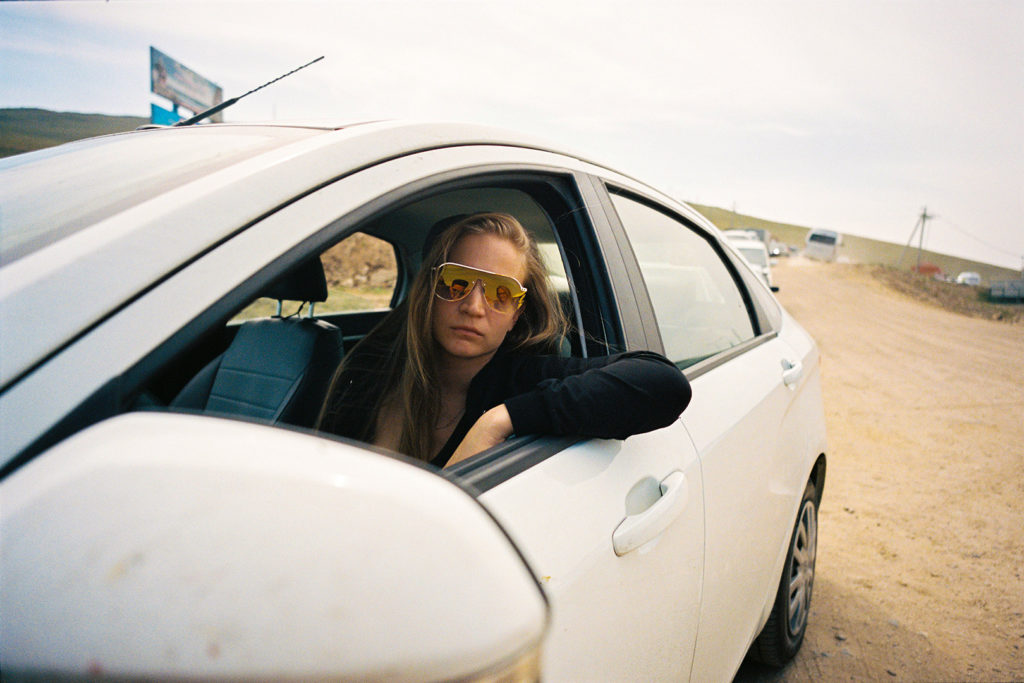
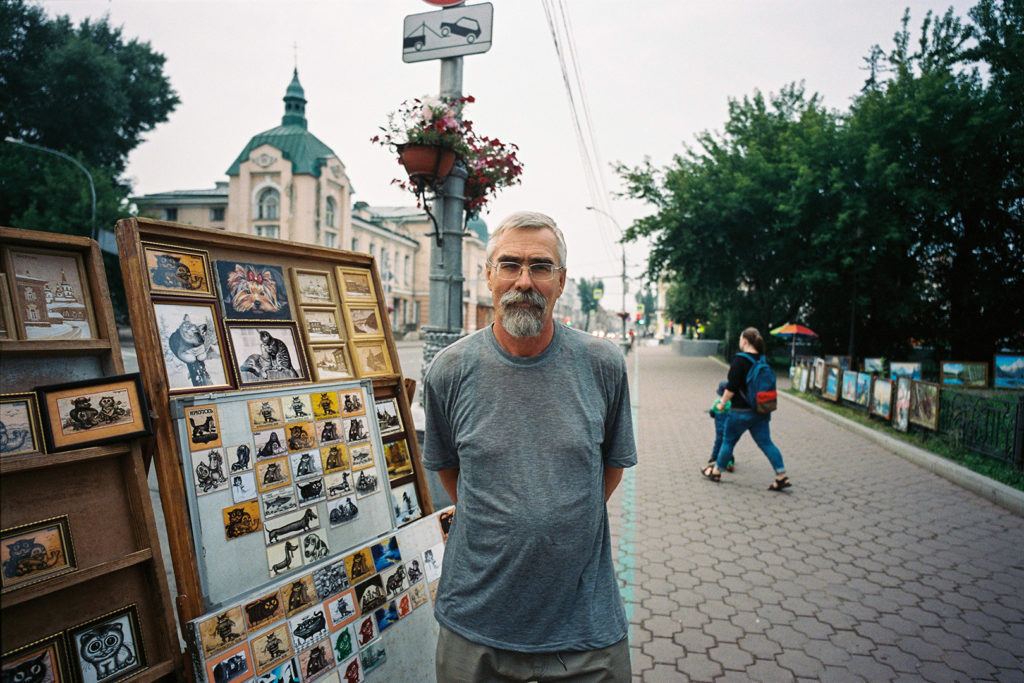
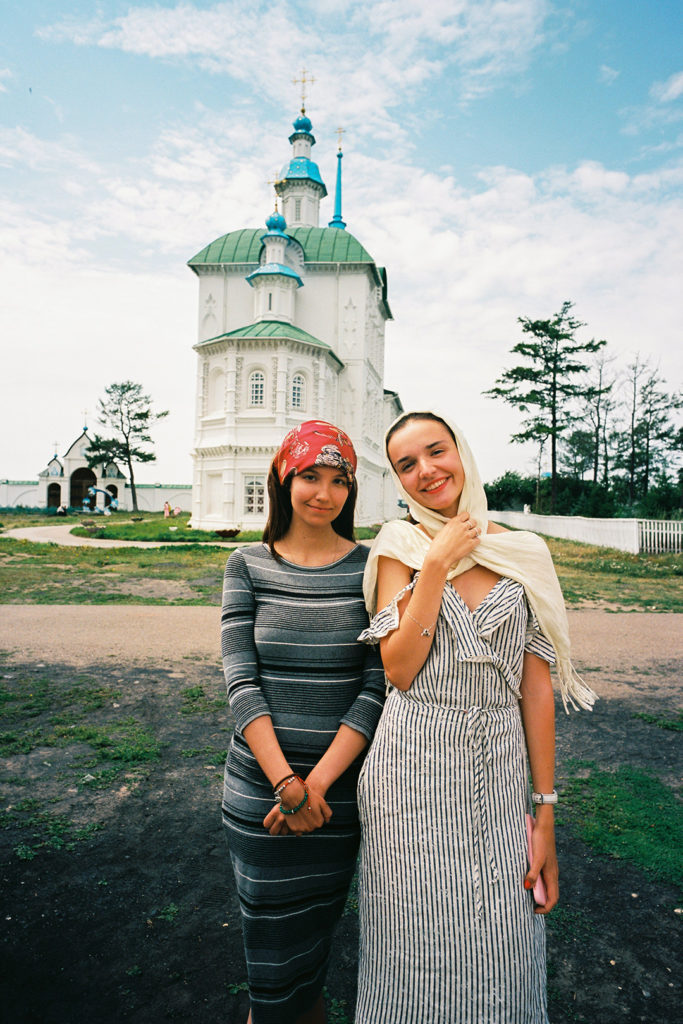
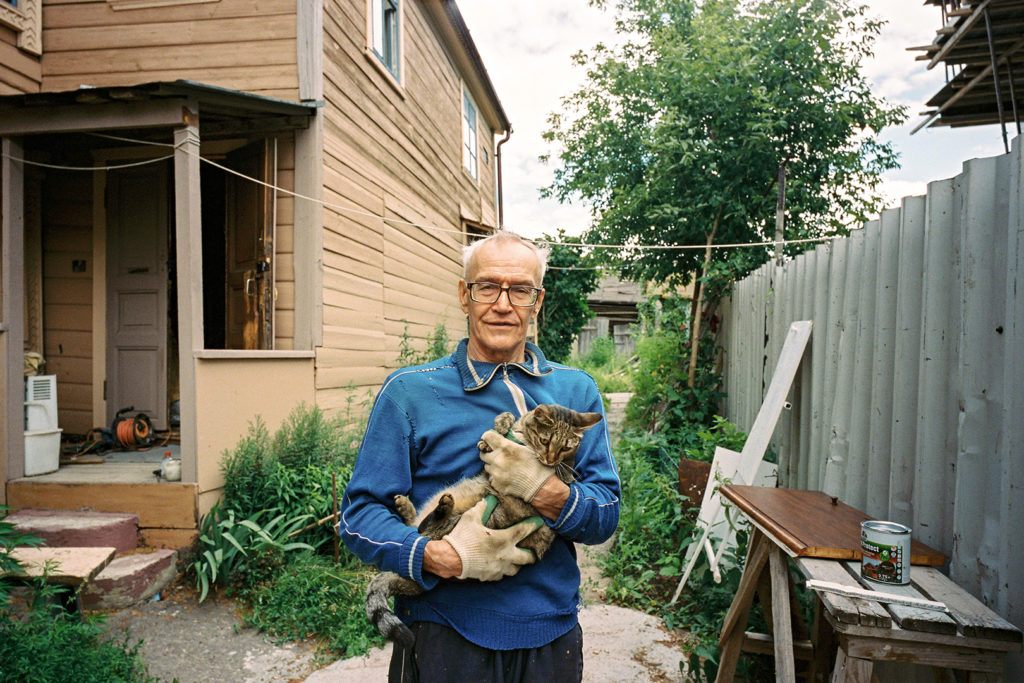
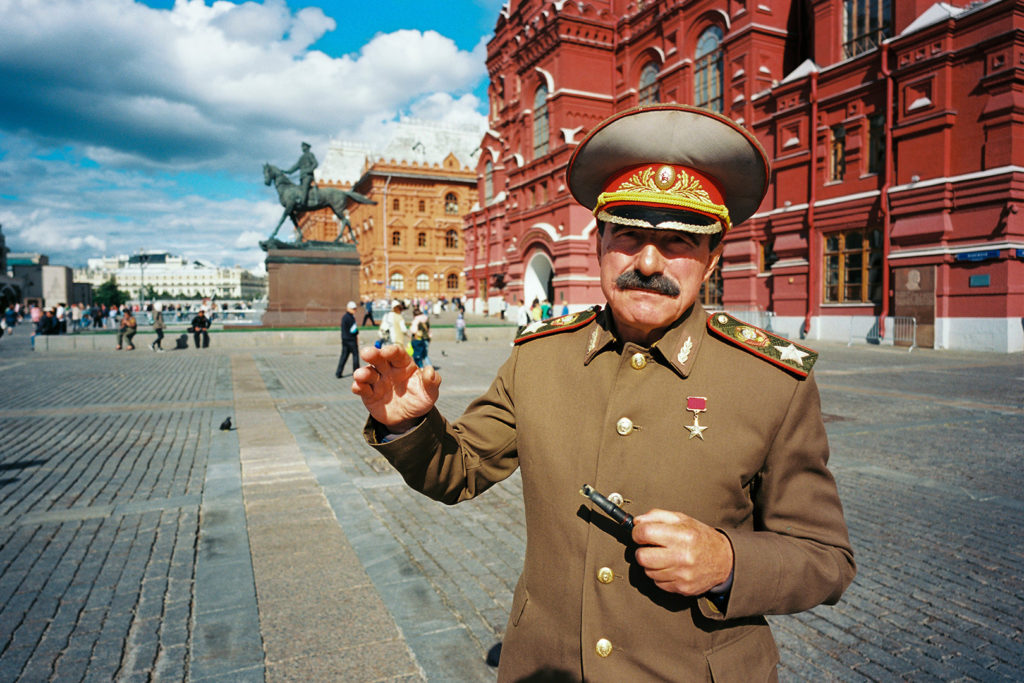
The Racedriver
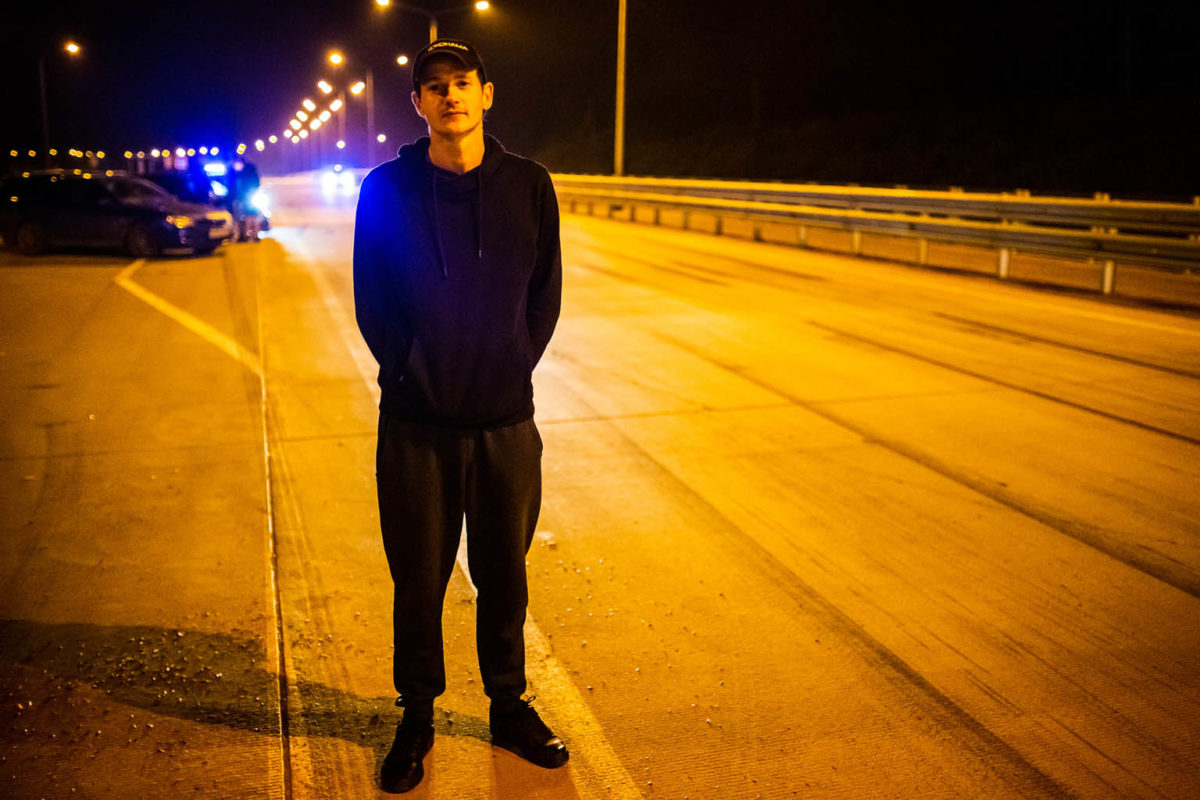
Sergei, 28 years old
I was born on Sakhalin. I’m a drag racer. The culture of drag racing came to us from the USA. It’s simple: two cars line up, then race for a quarter mile (402 meters). The faster car wins. A time under 10 seconds is considered to be fast, speeds get up to 290 km/hr. In Russia, drag racing is illegal.
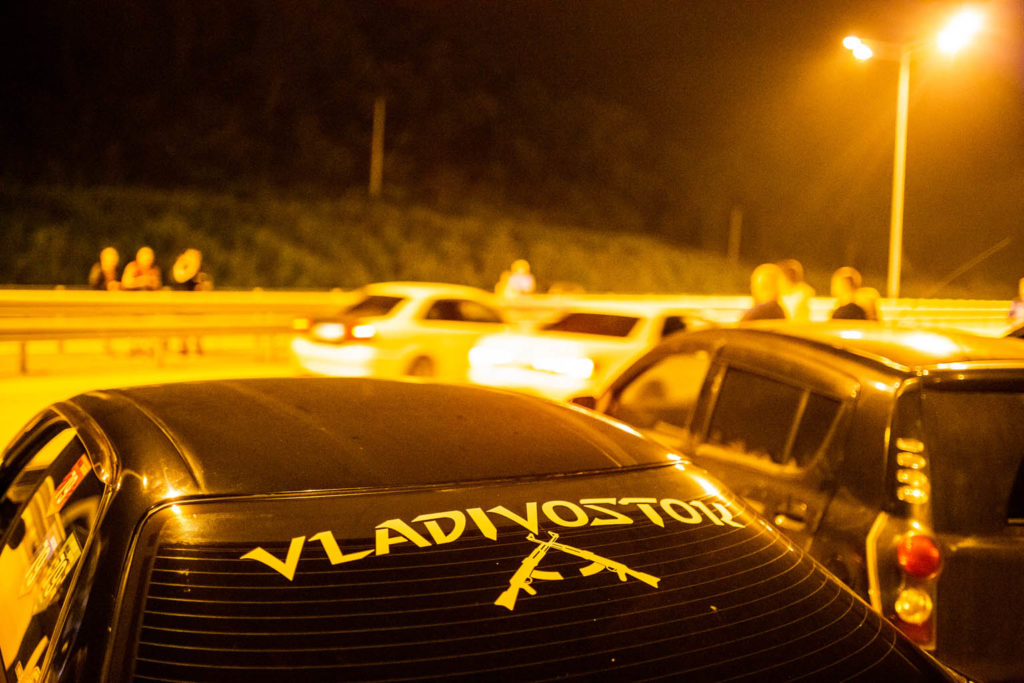
I don’t come from a rich family, I’m a child of civil servants. My mom worked her whole life as a city administrator, and my dad was a policeman. He is the reason I got addicted to cars since my childhood. He had a lot of cars. One day my brother and I tried to calculate how many and we settled on forty. We illegally began driving from age 13. On public roads. The Russian reality is all about taking advantage of the opportunities you have.
I remember this feeling, the first time I sat behind the wheel. I begged my dad for a long time, “Dad, let me drive”. He doubted it at first, but then one moment he turned to me at the parking lot and said “Do you want to start driving? Come on”.
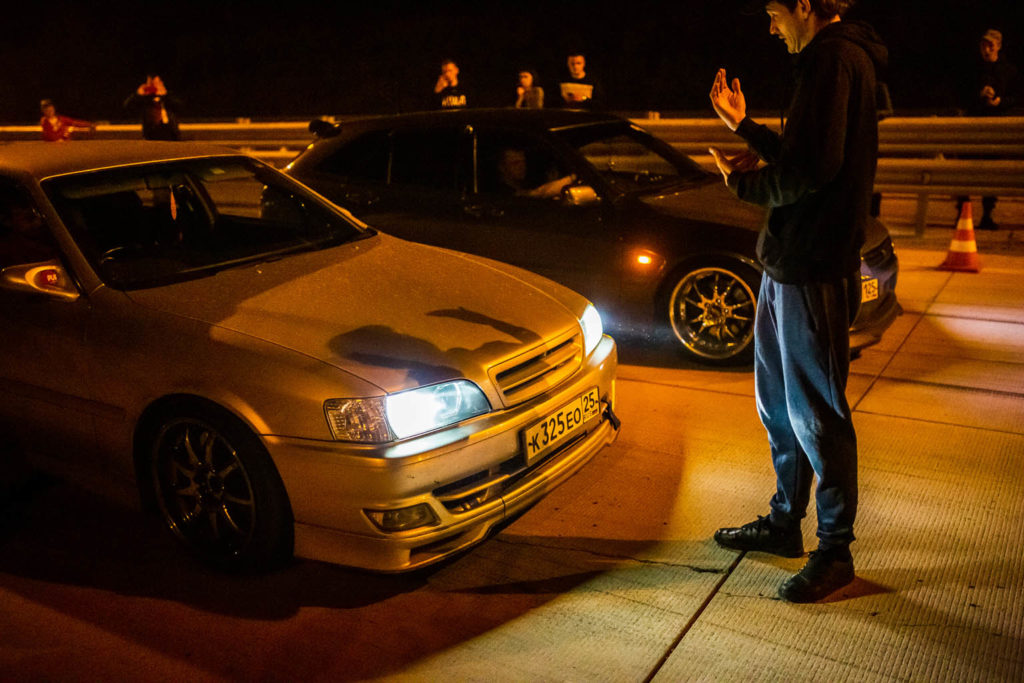
My first experience was in a Land Cruiser. This was a big jeep, so I had to put a pillow under my butt to look over the wheel. I sat in the driver’s seat, put my pillow beneath me and he showed me how the car functioned. We drove in one circle and he said “That’s all, you take a car for a ride now. I have some things I need to finish at home”. He left me alone after one lap in the parking lot. For three months I went back to that parking lot each month with my dad to do a lap. I enjoyed it. Often we would get water from the spring, and one day we forgot to do it and my mother yelled at us. My dad came to my room, gave me the key and said “The bottle is in the car, you know where the spring is, go. If you need something, call”.
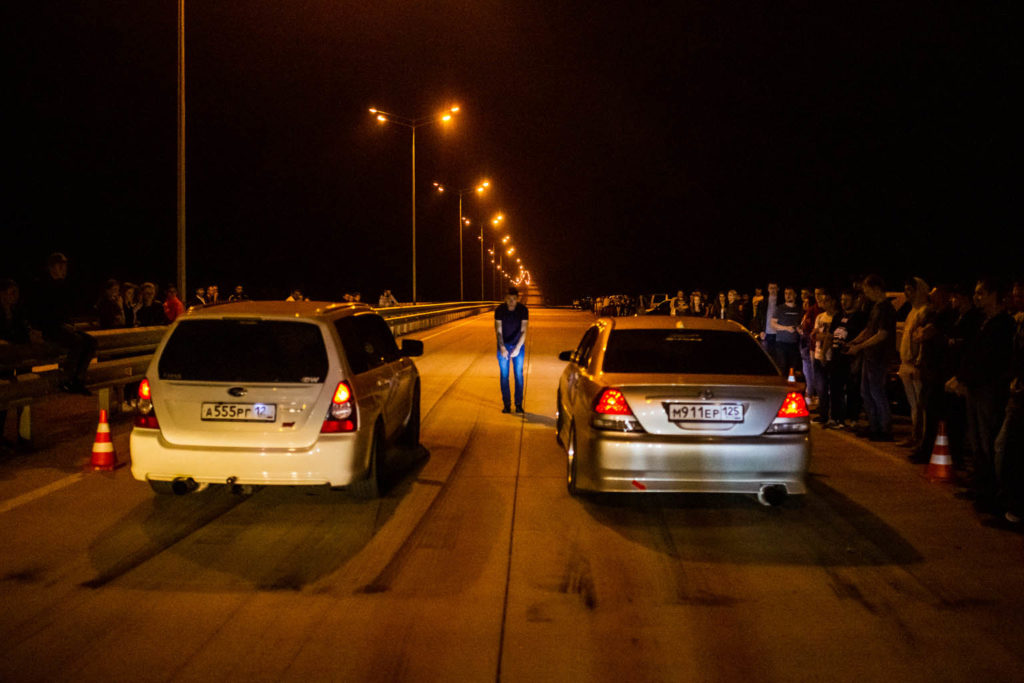
When I was deciding on a university after high school, I was looking for a major that works with cars. I graduated with a mechanics degree from Vladivostok State University of Economics and Service. I went to work as a mechanic at an auto shop. The year that I graduated, I managed to save money and buy myself my first car – a 1993 Toyota Mark II. I met a friend who introduced me to drag racing. I started going to races, and it inspired me to improve my own car: increase the power and improve other specifications. I gave the car a name: “Blackbird”. I spent days at the site, bought many parts, ordered and installed them. With every new component the car got better and better. It was getting more powerful, but that wasn’t enough for me.
It was winter time when the crisis hit. There was a 2.5x increase in the currency exchange, and all the parts I was buying were imported. My car was completely disassembled, one engine sold, the second bought. And we were just stuck. It was like my feet were covered in asphalt. I was so upset that I didn’t drive for two years. I was saving money to assemble the car back in a proper way. There was a lot to be changed for it to compete against the most powerful cars.
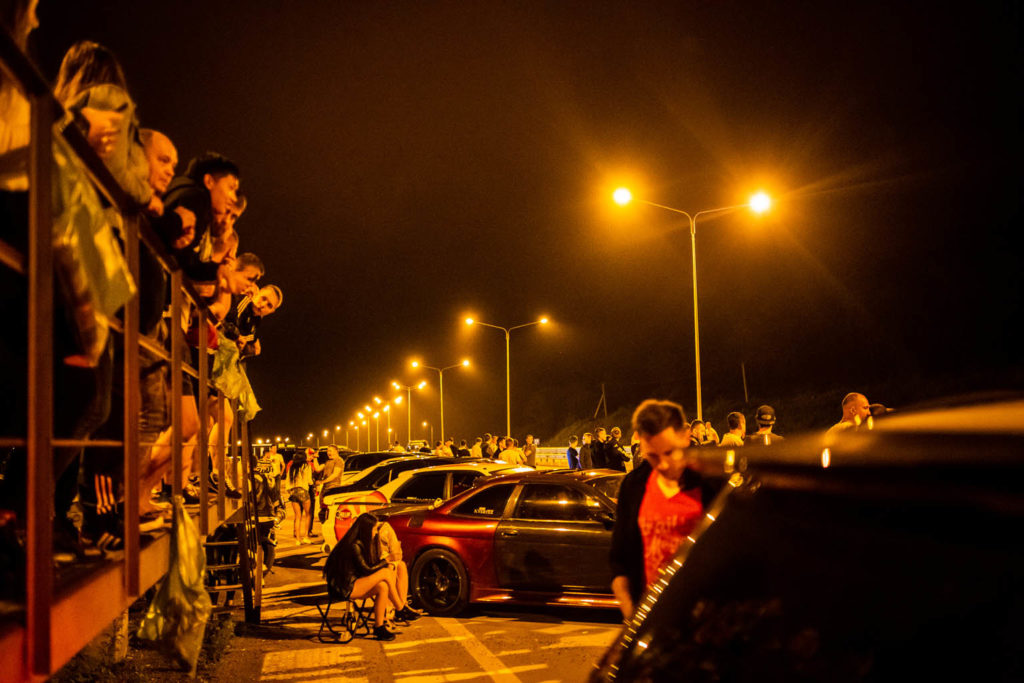
2007 was not a good year for me, from the beginning of the season it was breakdown after breakdown. In 2018 I made a difficult decision. I decided to sell my car. At that time I was tired of all this, I had an idea of buying a finished, assembled project and driving it. I put a car up for cosmic million rubles, as they would say in our circles. The car didn’t sell for two months, so I decided to sell it for parts: took it for tuning and sold them. My girlfriend was even more worried than me. She saw how difficult it was for me to take my car apart, and she said, no, you should not do it. As a result, instead of the million that I wanted for the finished car, I earned 1.6 million.
The car I have now I bought from Sergey, he also loves to collect cool cars. When one of our drag racing friends is selling a car, we want it to be in good hands.There are situations when a young man, a daddy’s boy, who has the money acquires such a car without ever having to deal with it, and then accidents occur. We always try to get such cars to good people who know what they are doing and who take a good care of the car. I participate in races with this car, I constantly illegally ride in the city.
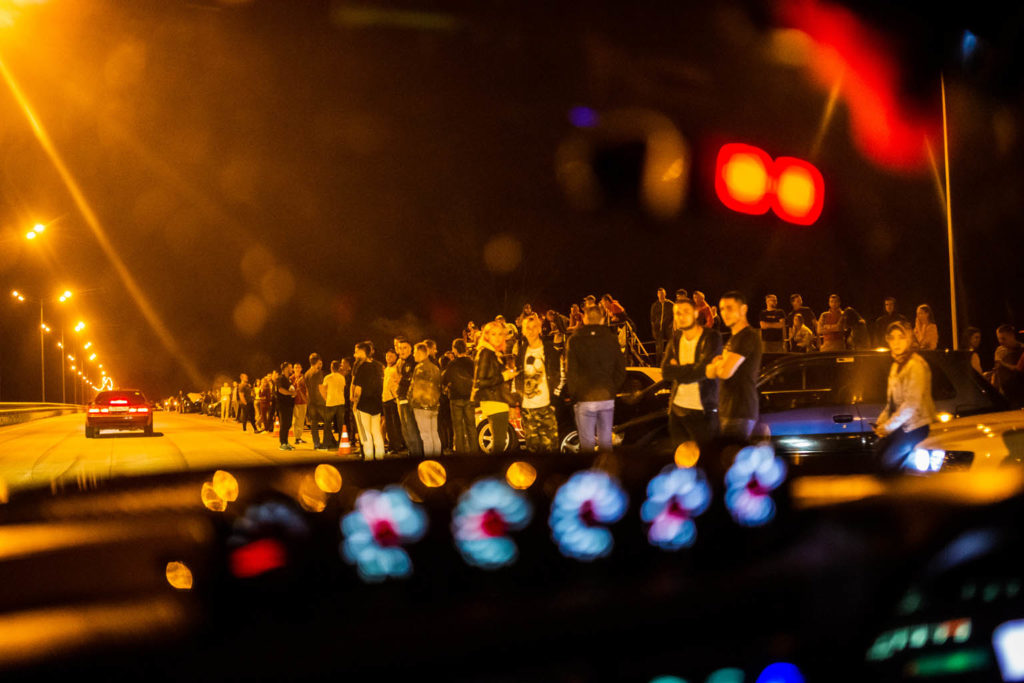
This is an illegal movement, police often comes, they disperse us, but sometimes we manage to come to an agreement with them. We would like this to become legal and leave the streets. To avoid conflicts with the authorities and misunderstandings of ordinary citizens.
In 2014 there was a huge epic fail. It all started with the usual dispute when our guys went to the old airport terminal to race. The police came and did not let them ride one weekend, then the second. “That’s fine, we won’t race here, we’ll race in the city”. It was simply unrealistic: a very large number of people gathered, two thousand and two young people in the most epic places – Aleutskaya Street, near the FSB building and Ocean Avenue. Police were helpless. They tightened the screws on us way too much and the whole situation blew up.
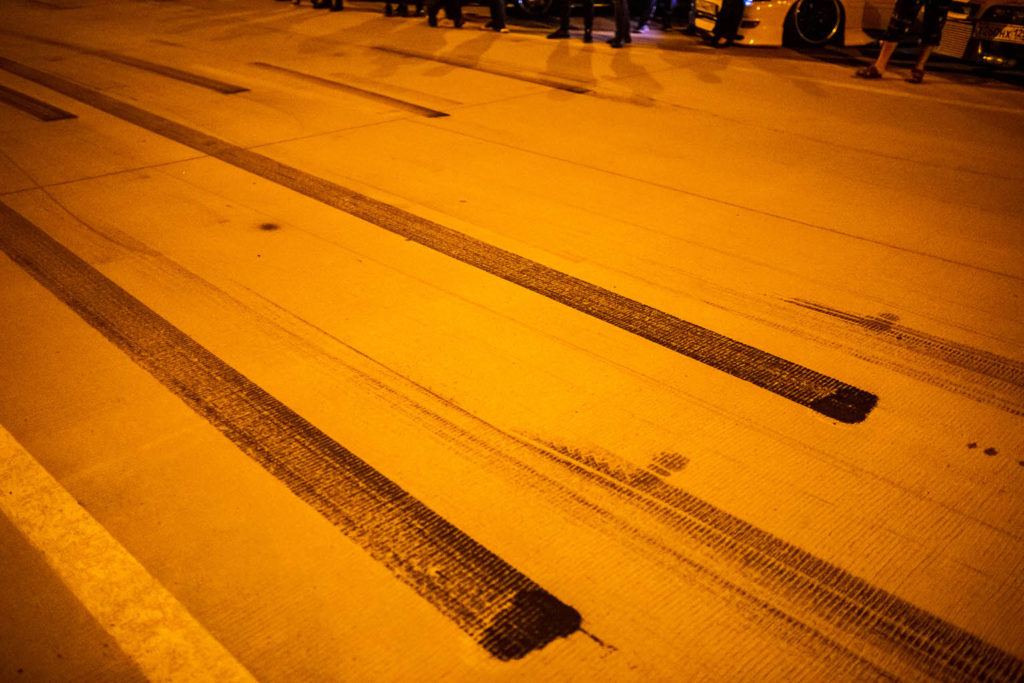
Authorities understand well what is going on and they know that the development of the drag racing movement is irreversible. We would like to become legal eventually. Firstly, it’s the safety of people. Big crowds attend racing events, although we try not to make massive announcements. Sometimes people who come here as spectators relax, get drunk and, as a result, get into tricky situations. Secondly, it is a public road. We hang up bags and tell people to pick up their garbage. We also have preventive conversations with some guys in the city, who drive arrogantly and start racing right in Vladivostok downtown. We are trying to help the authorities to move racing away from the city.
When I was younger, I allowed myself to play around in the traffic stream. Now I am looking for a free section of the road, where there are no cars at all, I go for high speeds there.
When I race, it’s a moment of complete freedom. My head is empty, not clogged with the everyday routine. I feel free. I catch the buzz. The fastest I ever went is 298 km / h. The limit of 300 is not broken. Yet.
